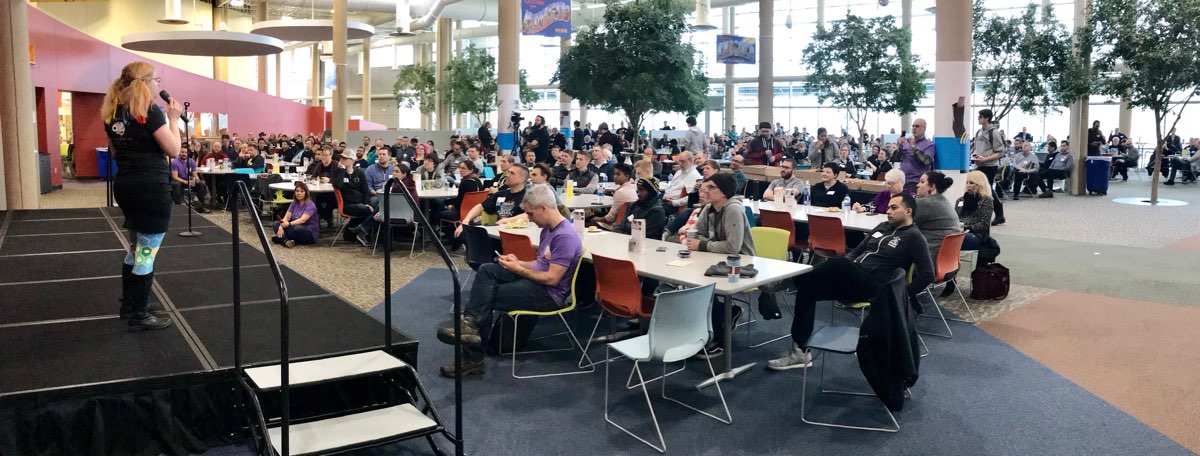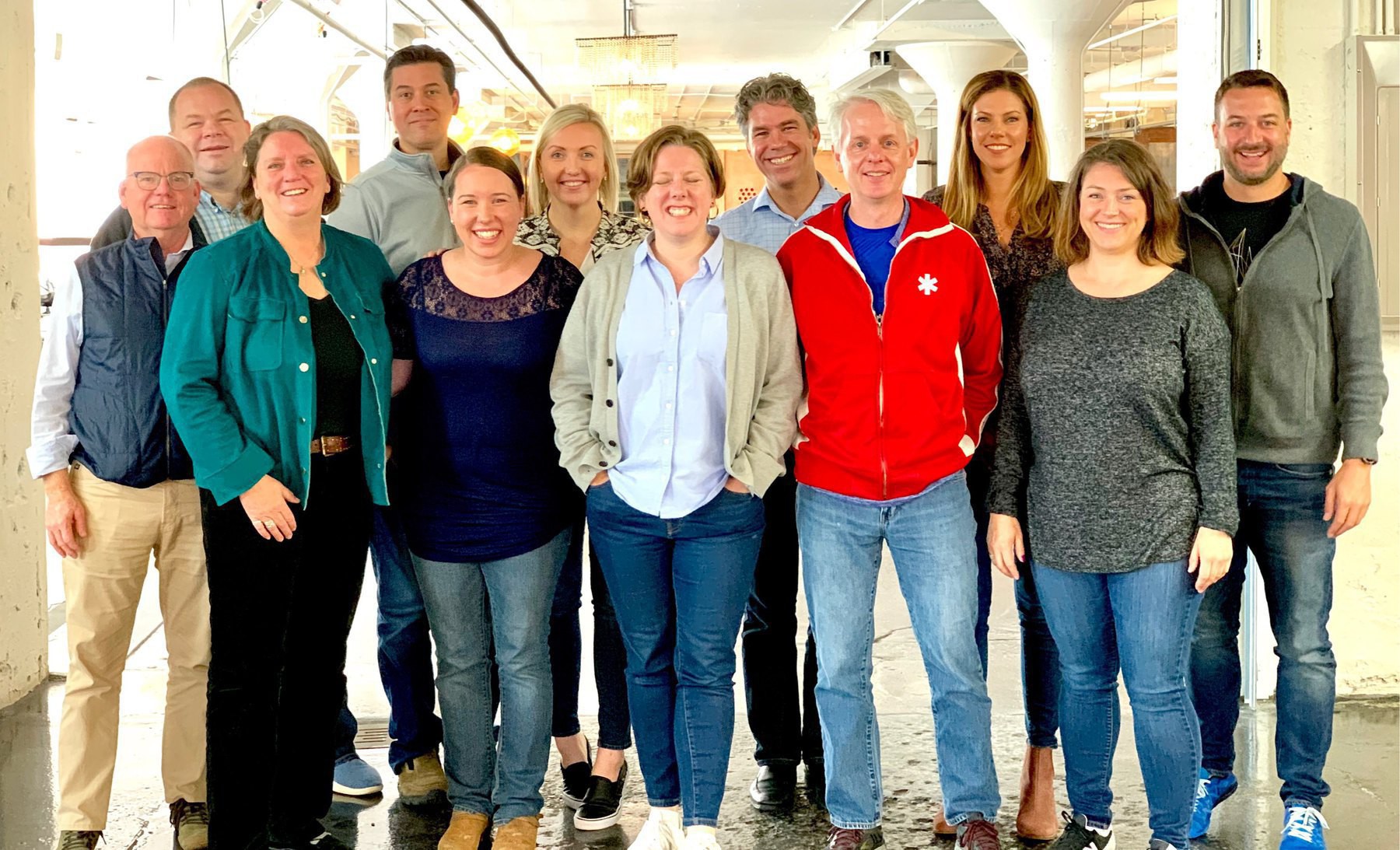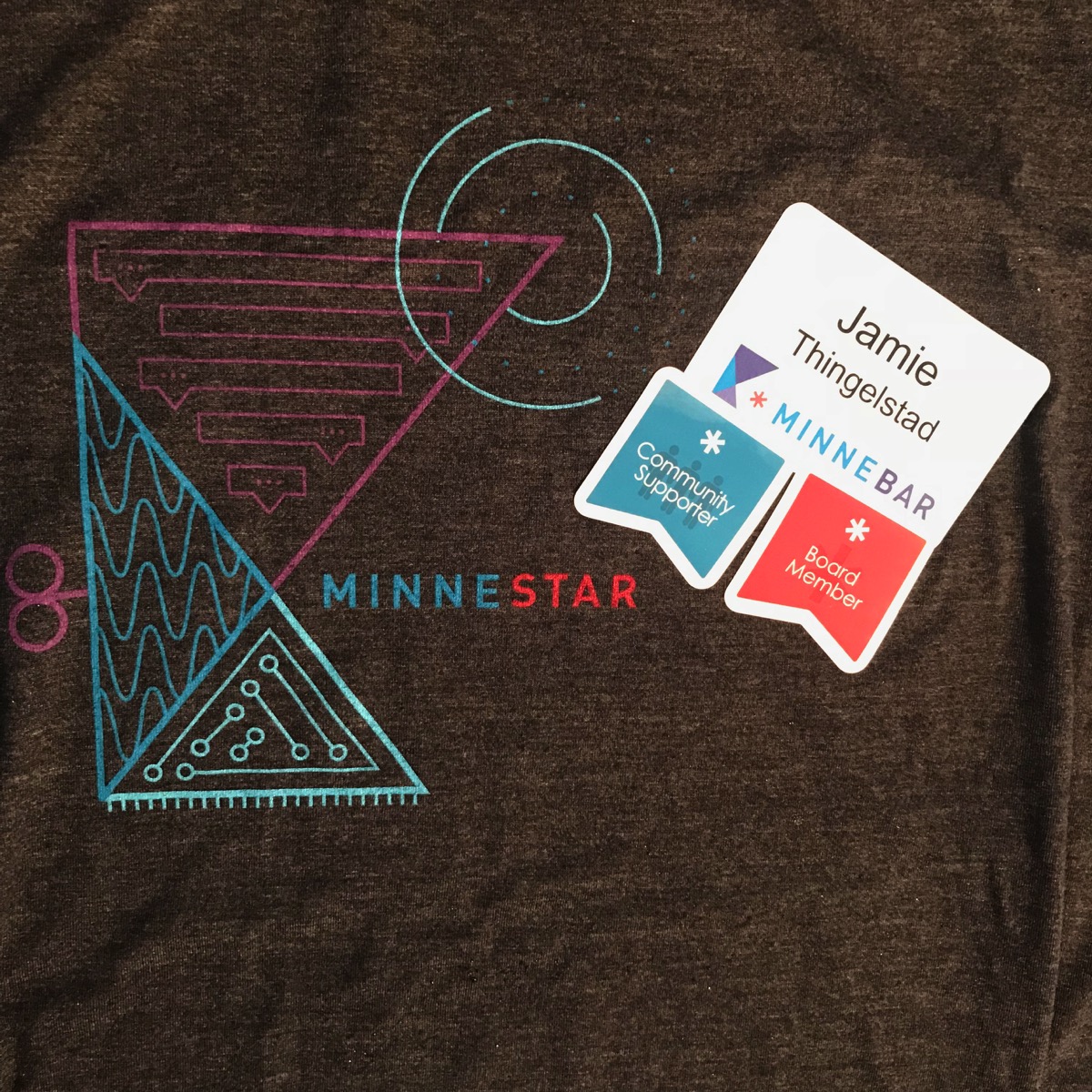Minnestar
Reflections on Twin Cities tech‑community events—Minnebar, Minnedemo and more. I explain the origin of “Minnebar,” recap sessions I attended and celebrate the people powering our thriving tech scene.
- Easy to parse list of upcoming community events
- No more than three relevant links to news about the tech community
- Community Supporter Highlight, randomly share a bio about one of the community supporters each issue
- Project Highlights from Community Supporters to submit and share a project (personal, hobby, business) that they would like to highlight for everyone
-
Let’s do our very first ride on St. Patricks Day at 5:30pm with a 30-minute EDM ride with Jess King! 🎉 Join the class! 🗓 If that link doesn’t work please try another device or another time. It should open into the Peloton iOS app and allow you to sign up for the scheduled session. If it opens in a browser it will give you a beta feature message.
-
Tag yourself to join our community and add the MInnestar tag to your Peloton profile! 🏷
- Computers Are Easy; People Are Hard with Bridget Kromhout
- Propelling More Women into the Ranks of Engineering Leadership with Ashley Monseth, Rebecca McCann-Young, Ethan Sommer, Cailin Wertish, and Millicent Walsh
- Blogging for Fun…..and Profit? with Chris Moffitt
- Web 3.0: Blockchain May Provide Us the Most Human Version of the Web with Matt Bauwens
- Pragmatic intro to functional programming with David Price
- Docker 101 with Rebecca McCann-Young
- Building Sandcastles with Leah Cunningham
Extending the Minnestar Community Supporter Program
In a recent conversation with Minnestar Executive Director Maria Boland Ploessl I was very pleased to hear about the amazing growth of the Minnestar Community Supporter program. Community Supporters were something that we launched when I was on the board of Minnestar to create an opportunity for individuals to support Minnebar and Minnedemo, in addition to companies. It was always significant, even on the first year, but it has grown a lot in recent years. The biggest part of that growth has been the structured year-end giving program which I was happy to be a matching supporter of this year.
The growth is awesome, but the program itself hasn’t changed materially since the launch. The primary benefit of being a Community Supporter is that you are guaranteed a ticket to the highly in-demand events that Minnestar hosts. That is a great benefit, but I’ve always wondered what more could be done for this great group of people that are helping support our technology community. Particularly what could be done outside of events.
In my opinion, being a Community Supporter of Minnestar should be table stakes for any technology leader in the region. It should be the most direct way to give back to the technology community we are all part of, and provide meaningful value to the supporter individually. I think supporting the events and community is solid, but the only meaningful value to the individual is a guaranteed ticket.
So what more could be done to grow the program? Some ideas…
Create Connection
People that become Community Supporters are a pretty special and fun group. Creating more connection in that group could be incredibly valuable. This could be done with in two phases.
First, launch an every-other week newsletter just for Community Supporters. This newsletter could include:
The newsletter could be the whole thing, but if there is an increase in engagement a forum for Community Supporters could get traction. I specifically do not mean Slack or Discord. Those are far too high engagement. A platform like Discourse seems much better suited to this. I think Minnestar could benefit from a Discourse like platform for everything, with Community Supporters being a member only section.
Membership
There needs to be more ways to show a persons affiliation with Minnestar, and recognize that support. I’ve been a Minnesota Public Radio member since 1995. How do I know that? My member card says it. I’ve been an Electronic Frontier Foundation member since 2010. It’s on my member card.
First step of this should be to issue an actual Minnestar Community Supporter member card. Cards have to be printed, they expire, etc. There is effort to do this but it gives me something to carry with me and show my membership.
This should also be extended into the digital world with POAP tokens. There should be a POAP for each year given to community supporters. Over the years, you collect each yearly POAP.
This would also be an opportunity to highlight the work of a local artist and create a uniquely designed card and token each year that isn’t just membership, but something that people feel like collecting.
I’ve been a Community Supporter member since the program started, but I have no idea how long that has been!
Input & Direction
Community Supporters as a group could be given the opportunity to have input on Minnestar activities. As a group votes could be taken. Thought would have to be given on what the votes are on. There is a Minnestar Board and various committees, and they should continue to do what they do. But there could be decisions that the community supporters are asked to give a vote on.
I had long thought that it would be really great for one of the Minnestar board seats to be a Community Supporter seat. In this case, the Community Supporters would elect amongst themselves one member that would represent them on the board. This could be facilitated via the forum above, with members raising their hands to serve and make their case followed by an official voting period.
This would lend itself exceptionally well to a Minnestar DAO, with membership gated via the Community Supporter POAP that you receive each year.
Ecosystem Benefits
It would be interesting to explore ways that other organizations in the technology community may want to extend benefit to Community Supporters of Minnestar. This is one of the key reasons to create Membership with a card and a token. Perhaps Twin Cities Startup Week would offer some unique opportunity. Or Tech.MN give a discount on membership. Or early access to certain events.
This would require that Minnestar reach out to have conversations around this with other events, and require proof of being a Community Supporter without access to Minnestar resources. I think this could work, and may be welcome from other organizations as well.
I reserved three Ethereum Name Service (ENS) names for Minnestar: minnestar.eth, minnebar.eth, and minnedemo.eth. Minnestar doesn’t have a need for them today, but I think they will in the future. I’ll have them over in my thingelstad.eth ENS collection in the meantime. 🤓
Minnedemo 37
It was great to see the Twin Cities technology community back together for Minnedemo tonight at the Reverview Theater. Minnedemo was also part of the Twin Cities Startup Week lineup.
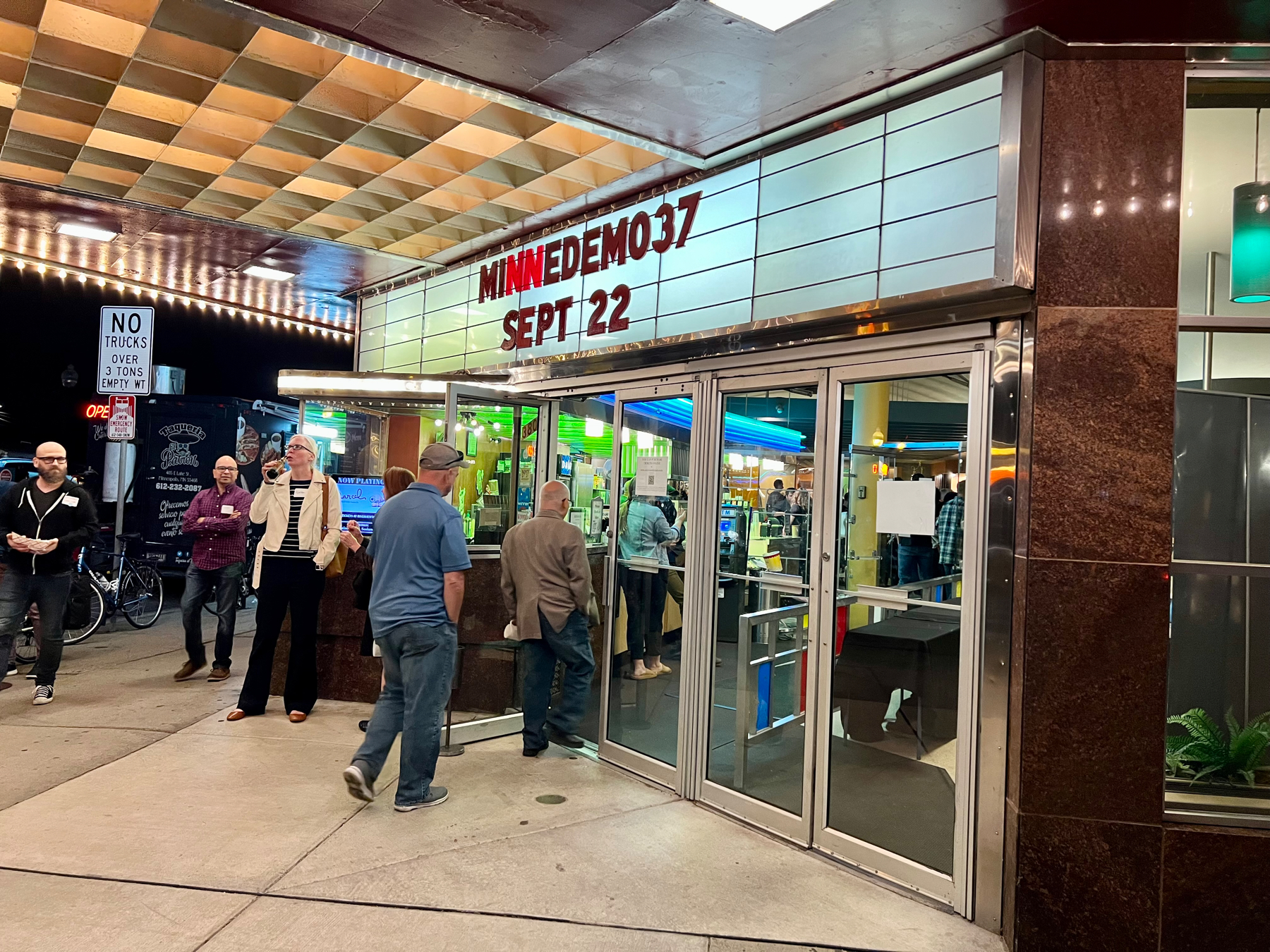
The presenters for tonight were great. I also have a special affinity for the vibe of the Riverview Minnedemos. Theatre snacks, food trucks, and a gorgeous evening are a pretty awesome combination.
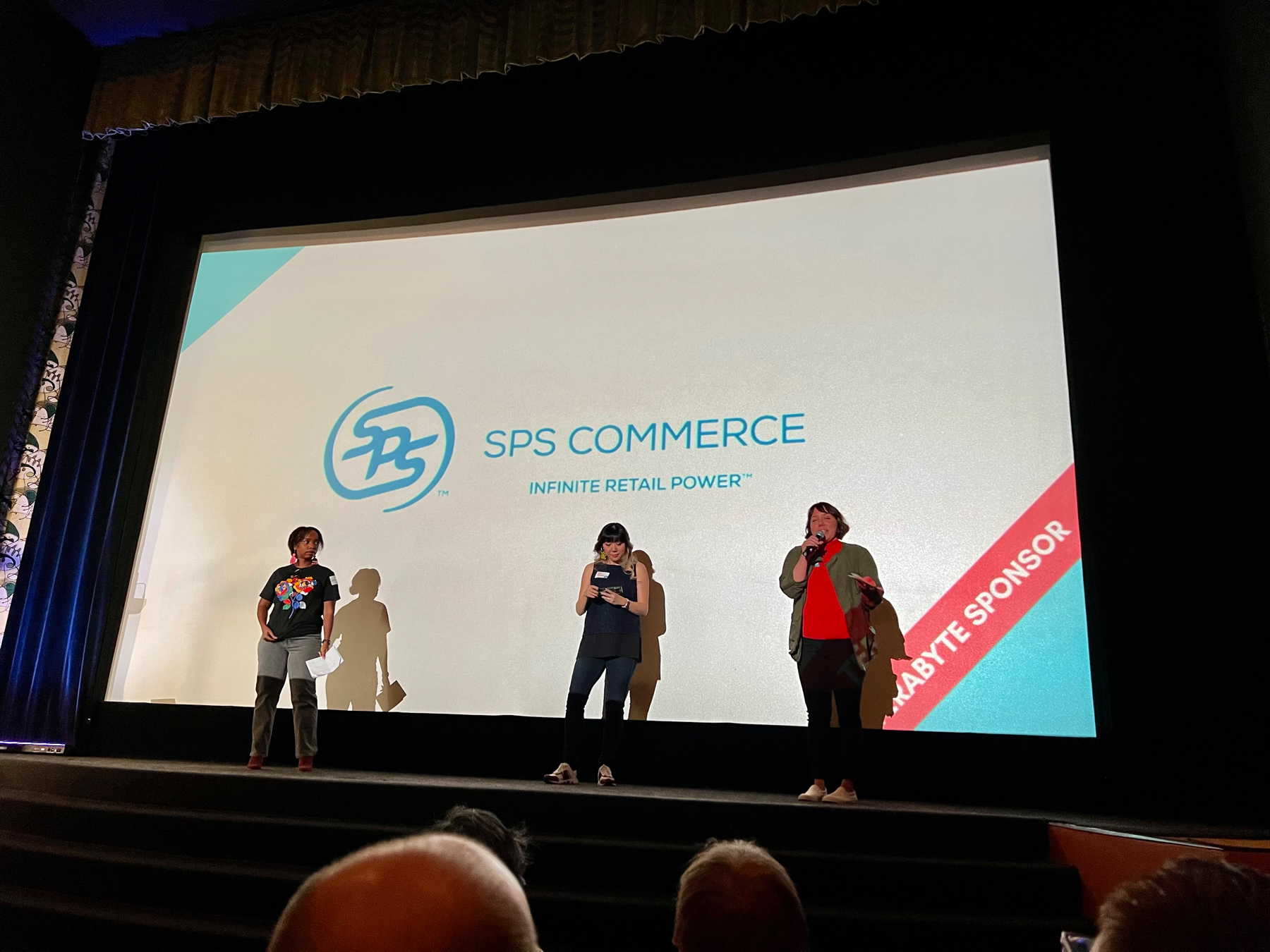
The demos were really impressive!
Sunsett.io: Well designed and easy-to-use product to merge reporting information from many platforms into a single view for small- to mid-sized companies.
Teqnizan Bluetooth Earrings: Cool idea of an earbud that is mounted into an earring and works outside of the ear canal.
Collab Spot: Allows you to overlay a collaboration layer on top of any website allowing people to build a website to work together in the actual site.
IntelligentRx: Mind boggling free tool that allows you to find discounts and coupons to apply to medications and save as much as 90% off the retail price. Incredibly impressive. Self-funded and growing.
Seraph7 Studios: Presenter had to cancel. 🙁 Guessing Covid.
Aurelius 3.0: Solution that collects end-user feedback, does speech-to-text analysis, and allows you to curate and analyze aggregate feedback.
SitEat: Service specifically designed to allow concession operators at sports venues to allow fans to order from their seat and get orders fulfilled much faster.
I thought IntelligentRx had the most promise to be very impactful for people. SitEat is something I would love to use at MN United games.
Even after 37 sessions, 259 demos, I’m still amazed at the creativity and ingenuity of the technology community here.
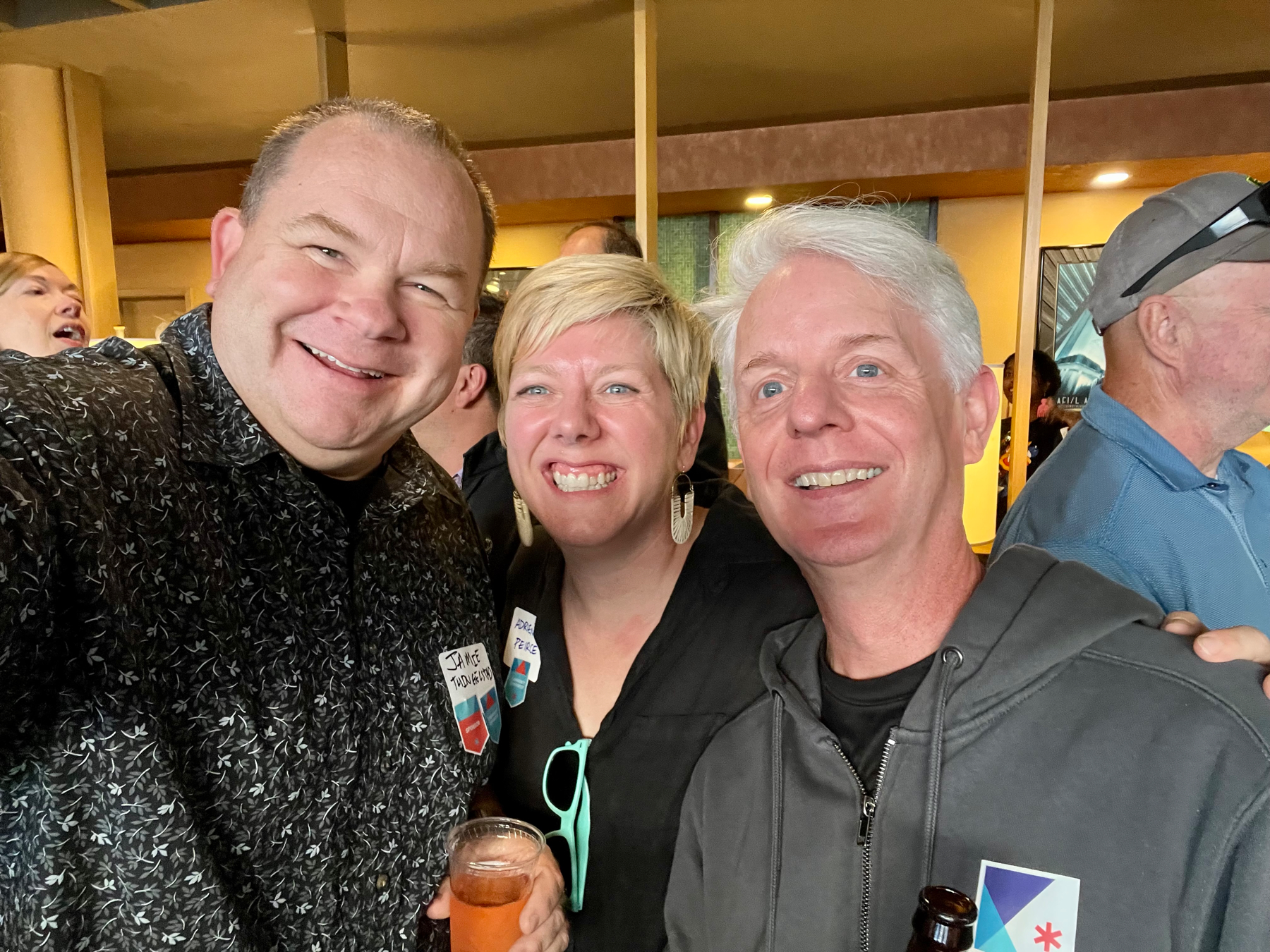
Former Minnestar Board members: Me, Adrienne Peirce, and Jim Bernard.
Remembering Matthew Dornquast
I first met Matthew when he was CTO at Fallon. It must have been 1997. I don’t remember how we got introduced to each other. We both went to the University of Minnesota in Computer Science but Matthew was a few years ahead of me and we didn’t overlap there. I do remember meeting Matthew though. We were building BigCharts and Matthew and I immediately connected on our shared passion for technology and specifically the Internet and the rapidly evolving web. Matthew was very smart, passionate, focused. I remember him talking about moving on and doing something new, the thing that eventually became Code42. Not before I tried to persuade him to join our ragtag band at BigCharts. But it was very clear that he wanted to pursue something on his own.
We stayed in touch over the years and would regularly meetup to chat technology, the Internet, startups, etc. He returned my favor of gently trying to bring him into BigCharts when we had lunch downtown and he gauged my interest in joining them as they started to build out CrashPlan. I was an early user of the peer-to-peer version of CrashPlan and used it to for a neighbor and I to be each others offsite backup. As always, Matthew was passionate, excited, driven and always focused on the technology.
Matthew and I would regularly connect around our shared passions and joint focus on doing everything we could to make the Twin Cities technology community stronger. Matthew was always a dedicated supporter of Minnebar and Minnedemo. He cared deeply about the technology community around him, and always showed up to support and grow the talent around him. I will forever miss that about him.
Matthew and I never did get to do a project together. I have an incredible amount of respect for what he built. Through the consulting business of Code42 they bootstrapped a product that became the largest Series A investment in Minnesota history. In the middle Matthew made several bets in early stage companies by building the technology in return for some equity.
Unfortunately it has been a few years since we connected. After Matthew moved on from Code42 and moved to New York we didn’t have those serendipitous moments to connect. But by his tweets you can see that his passion for technology was present through all of his life. It is sad to see a mind as bright as his go so early in life.
Thank you Matthew for all you did for the technology community, and for building so many things that continue to provide value today. You will be missed.
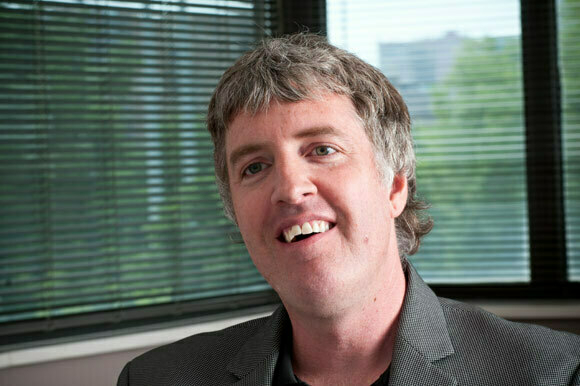
Related
Things 4 Good on Endaoment
I had been thinking it would be really cool if Donor Advised Funds (DAF) were open to accepting crypto tokens as deposits. There has been a lot of wealth built up in crypto and it would be very beneficial to create simple means to move some portion of that to non-profit organizations. Shortly after this I stumbled upon Endaoment.
Endaoment describes itself as “We’re a tax-exempt Community Foundation built for decentralized finance and focused on social impact.” Endaoment is a DeFi version of a DAF like Schwab Charitable. This morning, while Ethereum gas prices were predictably low, I sat down to play with this first hand.
Setting up your Fund
I went to Endaoment and connected to my wallet. Easy enough, just like any other Web3 application. I then created my own fund. This was super simple. I needed a name, I chose Things 4 Good. Gave it a tagline. I then associated my name and address. There were no credit checks, no social security numbers, just basic contact information. After this I submitted a transaction that deployed the smart contract for my DAF.
Now I had my own contract associated with Things 4 Good, and it was time to provide an initial deposit to the fund. Endaoment requires a minimum $500 transfer so I sent in 0.15 ETH. When Endaoment receives the ETH they immediately transfer that to USD Coin (USDC). They sent me a receipt for tax purposes for the full value of the 0.15 ETH. Endaoment takes a 0.5% transaction fee, and there are some fees associated with the transactions to USDC, which are taken out after.
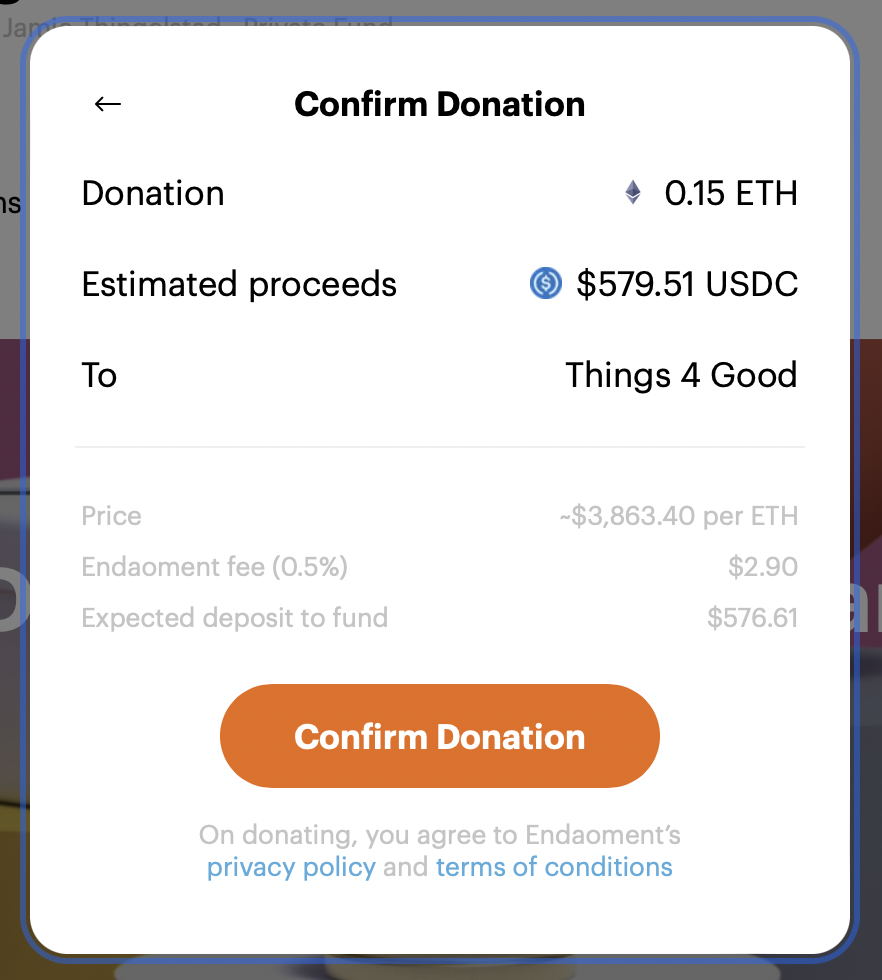
With that done, my DAF was fully established on the Ethereum mainnet, funded, and ready to use.
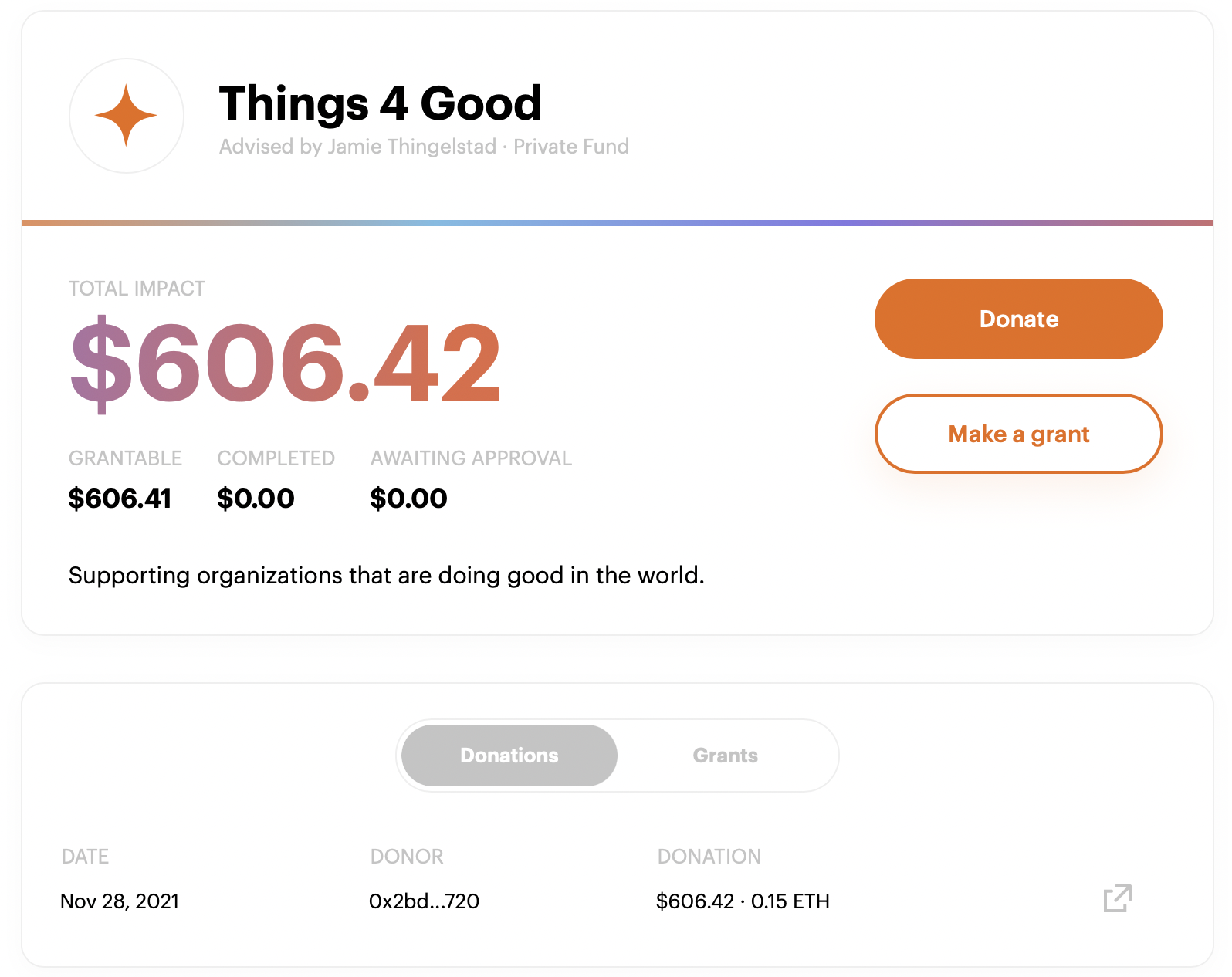
Granting Funds
Now that Things 4 Good was setup I wanted to try issuing a grant. The Internet Archive is an organization I have supported for a long time and I thought it would be a fitting organization to make a first donation to. I picked them off the list of organizations registered on Endaoment. This was fun to me, because this is also on-chain, so to send the grant you interact with the smart contract.
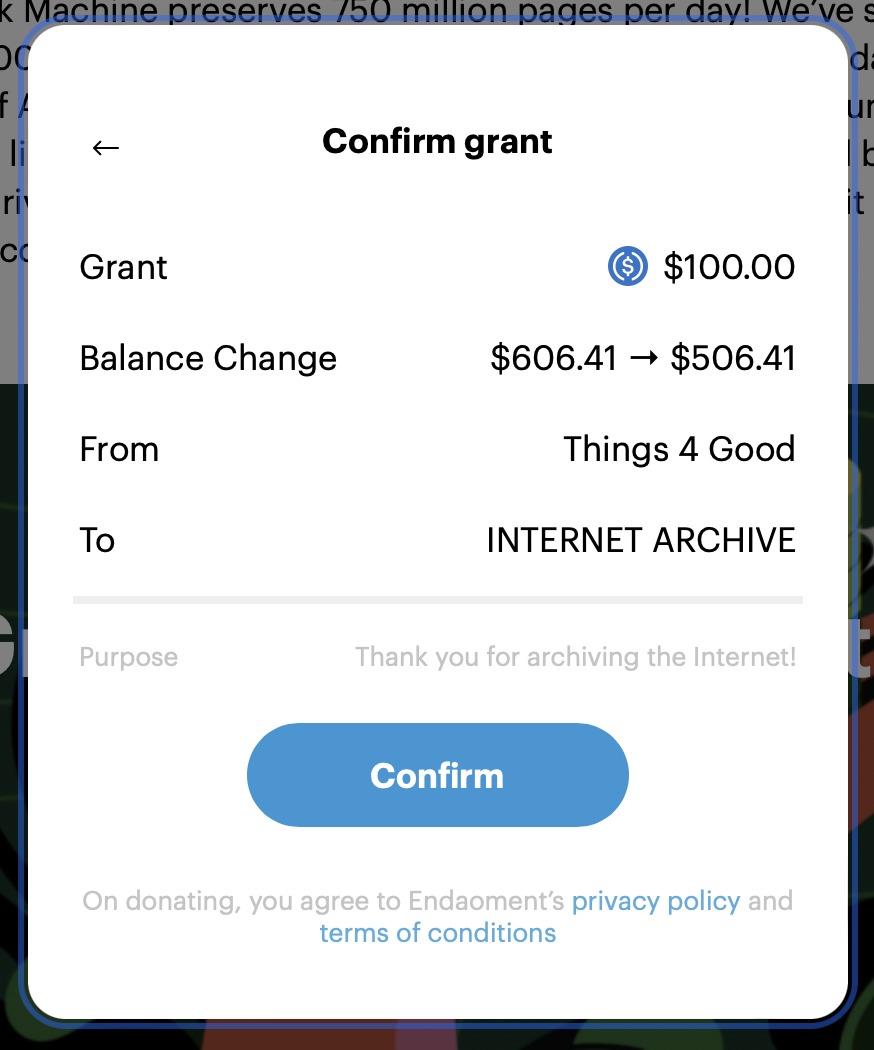
I appreciated this as it felt like a much different level of control than a typical DAF. We use Schwab Charitable and you make recommendations, they send checks, and you get emails saying it all happened but you can’t actually see it yourself. With Endaoment I can see my transaction and know exactly what happened when.
With very little effort I have my DAF setup on the Ethereum mainnet, funded, and already distributed a grant. This is holy crap amazing. 🤯
This seems like a powerful and needed capability as you manage your crypto assets. Plus it is an incredible example of the power of DeFi applications built on Web3 technology.
Deploying Organizations
After chatting with some of the Endaoment team on Discord they showed how you can deploy any existing 501(c)(3) organization. Any user can fund the deployment of the smart contract for that group. So I went ahead and deployed Constellation Fund and Minnestar on Endaoment.
Techies who Peloton First Ride
When Minnestar decided to launch these “Techies who …” communities I was really excited to get a Peloton group setup! As if by design, Peloton also just launched their brand new scheduled session feature that works perfect for this. So we are getting our very first ride scheduled, and I thought it would be fun to do it on St. Patrick’s day!
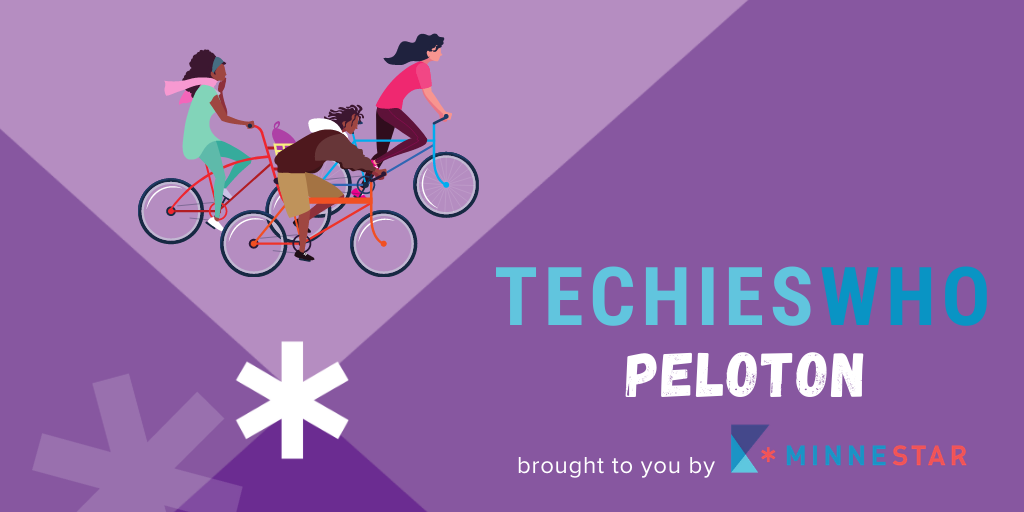
If you are a Peloton Cyclist join our first Techies Who Peloton ride! 🚴
The Importance, Accessibility, and Inclusivity of Connecting Online
We have all shifted quickly to online platforms for many of our interactions. It is easy to see some of the challenges with this. Technical barriers. Cognitive confusion leading to “zoom fatigue”. There are also some powerful benefits online that were not as obvious before.
Work
For “knowledge workers,” most everyone is doing their work distributed, and I have noticed an equalizing aspect to it. The two dimensions that I see the most are geography differences being lessened, and more balance between those that are outgoing versus more introverted. When everyone you work with is in an equally sized video frame right in front of you, geography is only notable to the extent that it may be evening where they are and morning for you. I’ve had many team members share with me that they have never felt more connected with the members of our various offices. And perhaps more powerfully, our team members in other offices have felt like they can contribute and engage better with the rest of the teams.
This reinforces one of my beliefs about remote versus centralized teams that it is hardest to do both. Fully remote is a considerable leveler, and everyone will have to accommodate. Entirely local is the default that humans have used for millennia. The tricky part is doing both. My hope is that we can take the learnings developed during this pandemic and apply it to improvements and empathy going forward to keep these benefits in place.
Large group gatherings have also surprised me online. They work very well, as long as you keep the time short. And one of my favorite parts is that you can successfully engage in Q&A with the audience. I’ve held team all-hands meetings for decades, and I long ago decided to not open up time for Q&A because the chances of someone asking a question were near nil. The social dynamics of being that one person in a room of 250 that stands up with a question are just too challenging for most individuals to navigate. Online tools though by necessity must create a feature to do this. They have to enable it. And in doing so, they remove the barriers that inhibit people. I’ve found much more engagement than I’ve ever seen in in-person large group meetings.
mini minnebar
Last weekend was supposed to be the annual Minnebar unconference. Minnebar is one of my favorite events of the year. Over 1,000 technologists, collecting around community-led topics with about 70 sessions throughout the day. Minnestar, the non-profit behind the Minnebar, pivoted online and held mini Minnebar and I thought it was great!
The event was hosted on Crowdcast, and it was impressive. The event had a single track, versus multiple parallel sessions as it usually has. That was just fine to me, and it made me think that there could be five or six events like this throughout the year and get the same quantity of content to an even broader audience.
However, the big win to me was opening the event to a broader geography. One of the sessions I realized my brother would like. He lives three hours away and would usually never be able to attend Minnebar. But since it was online, I sent him the link, and he was on in 5 minutes. The event drew people from around the state. Minnestar has debated for years about how to reach people outside of the metro area. I know from dozens of board conversations. We considered for years bringing our events to other cities, but getting them online and opening up globally brought the program there. There was even a person from Turkey who attended Minnebar!
I also felt a lot of energy from the event. It hit me how important it was that the event happen, in some form. I needed the connection to the technology community to still be there. It was so great to see comments in the stream from friends and give a 👋 to them. It filled my day with energy to connect and so what if we couldn’t do it in person with happy hour, we still did it. It reminded me how vital these connections are, and we all must forge ahead.
A New Way to Mourn
My last observation on this topic is from an episode of the Daily called A New Way to Mourn. I highly recommend listening to this. It is a touching story with a powerful message. In short, this highlights that many funerals are being queued into the future. “We will get together to remember Bob when we can connect as a community.” There is a massive problem with this. These are essential rituals and are vital to loved ones and friends going through the mourning process. Deferring them to some unknown future date is going to cause significant problems.
This story about mourning and celebrating a departed loved one online is incredible. And again, I note the accessibility component. Some people can’t travel for various reasons and may be unable to attend a traditional funeral ceremony. Typically they would be excluded from this critical aspect of the mourning process. Hosting a visitation and funeral over Zoom opens up new avenues and accessibility for loved ones to be part of the process.
(mini) Minnebar
Attending (mini) Minnebar this morning, the very first online Minnebar! It is awesome to see minnestar pivoting to further its mission during the Covid-19 pandemic. 👏
Dan Lew’s opening session on “What Tech Can Do About Climate Change” was a great way to get started.
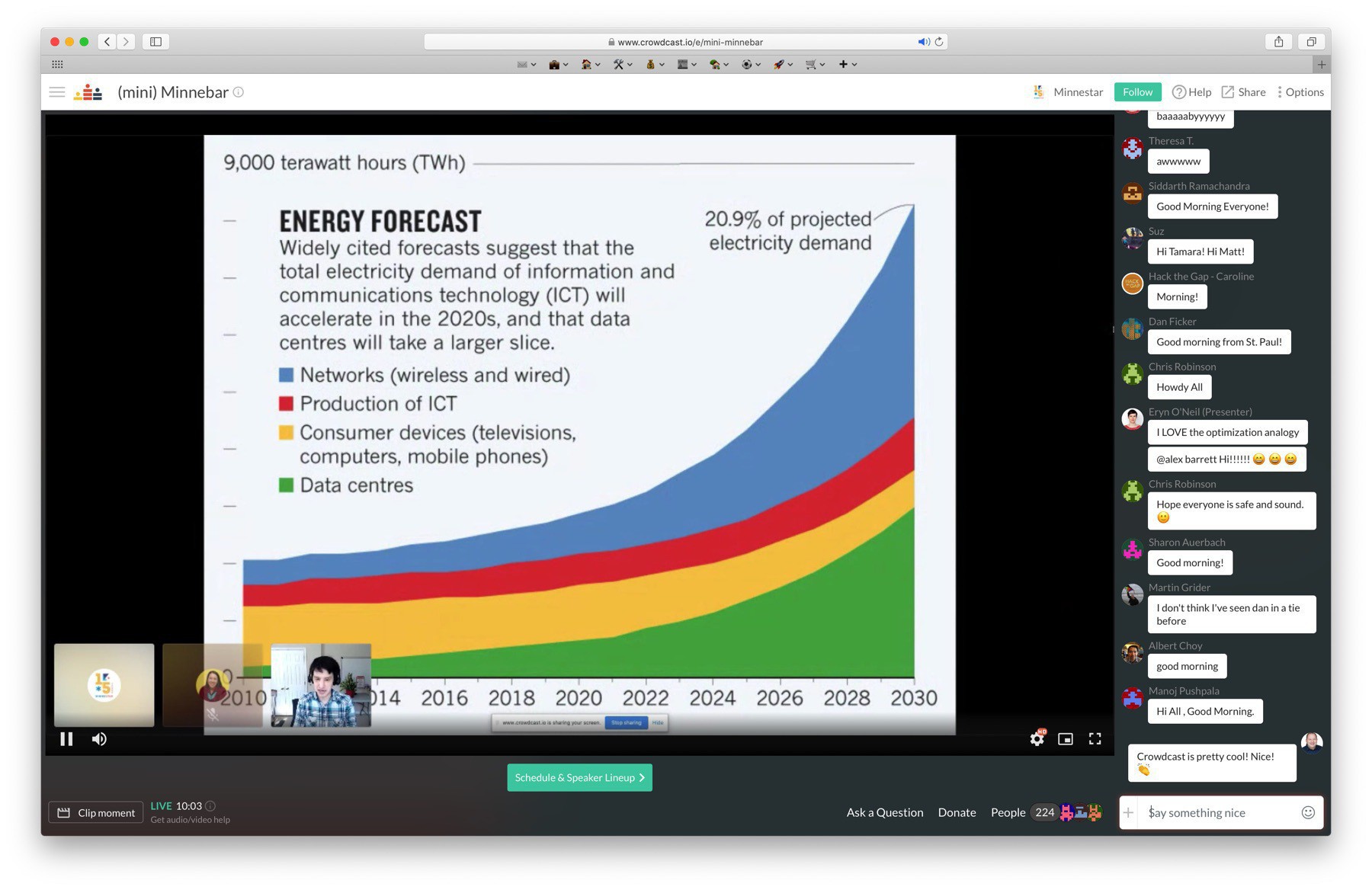
Of course very proud that SPS Commerce is a terabyte supporter! 💙
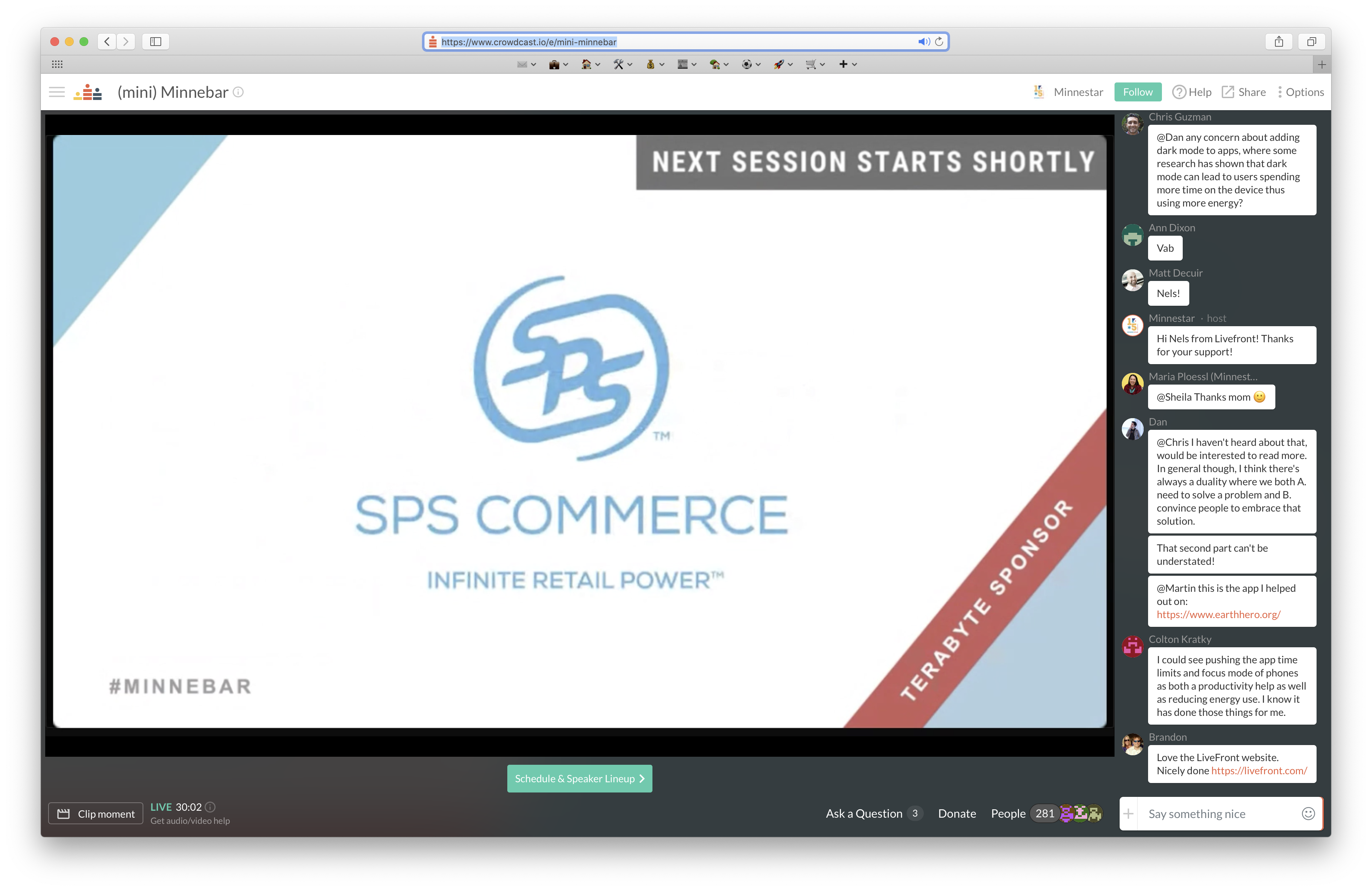
This is my first time using Crowdcast and the experience is very good. 👏
Joe Karlsson with “An Introduction To IoT (Internet of Toilets 🚽); Or How I Built an IoT Kitty Litter Box Using JavaScript”. Fun to see the interesting projects he’s doing. Predicts we will see this continuing to grow. For sure! 👍
Having Minnebar online is an interesting tradeoff. Something I could never do that I just did, was send the link to a number of friends, none in the Twin Cities, and suggest they sign on. There is a big inclusivity win with events moving online. 🤔
Kisha Delain with “Pair programming: Supporting Your Jr Devs Right”. It is so great to see #TeamSPS presenting at Minnebar! Kisha brought some great observations on what works to make pairing work well, which is one of the most critical ways that developers learn. 💻
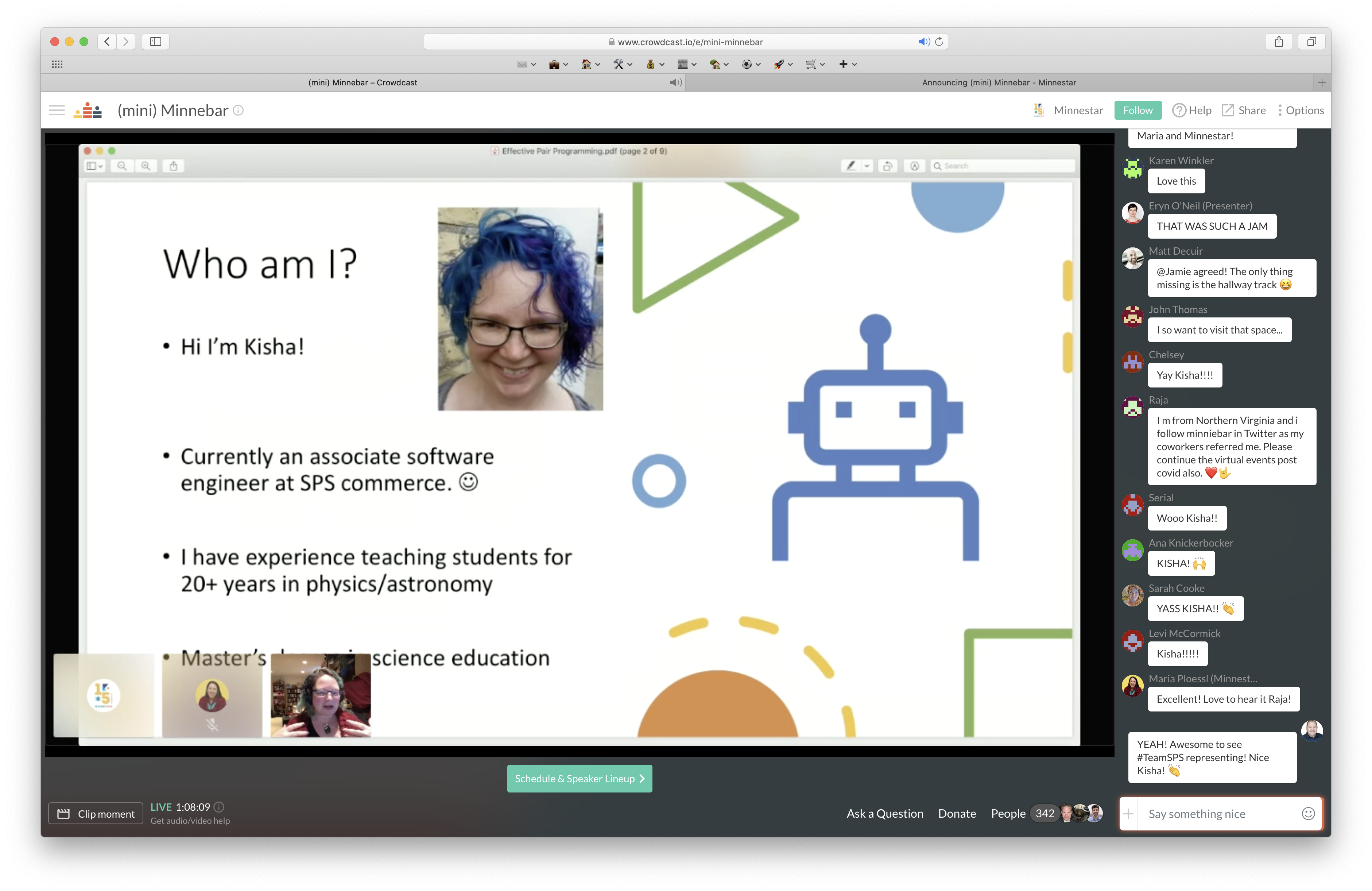
It is interesting to me that online events tend to have a structured method for facilitating Q&A from the audience. This is one of the things that seems to work way better in online events. Asking questions in an auditorium with 500 people is almost always a bust.
… due to other commitments I had to cut out after the first three talks. I really enjoyed this Minnebar and can’t wait to see the next iterations of events from minnestar like this! They even made the playlist available if you dug the tunes! 🎶
See also Minnebar collection.
Adrienne Peirce and I were honored to be recognized for 9 years as Founding Board Members of Minnestar. We finish our board service at the end of this year, along with Kevin Spreng, who wasn’t able to be there tonight. It’s been an honor to be part of this organization!
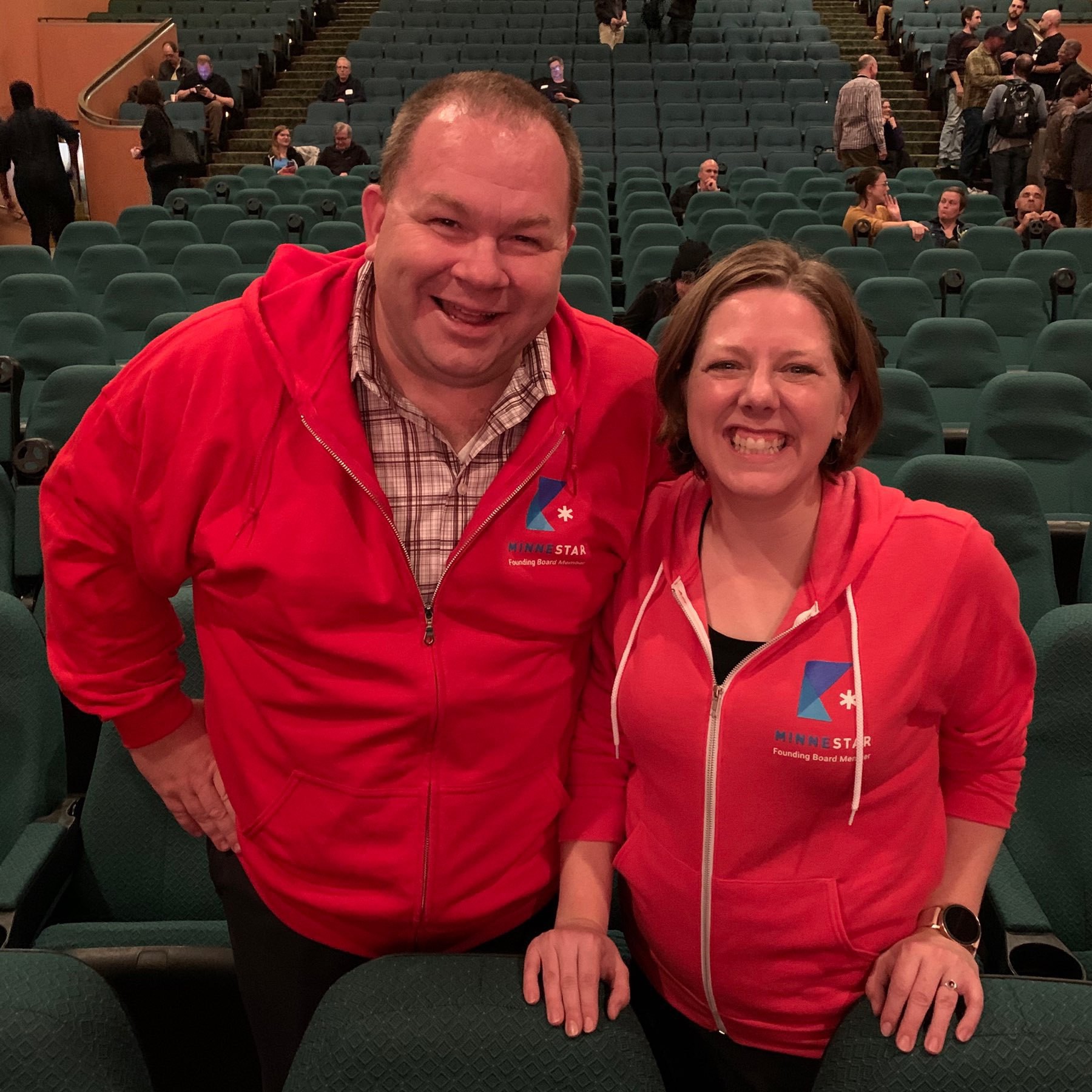
Minnedemo tonight was absolutely fabulous. Such a great variety of demos! A couple apps I installed while watching the demo!
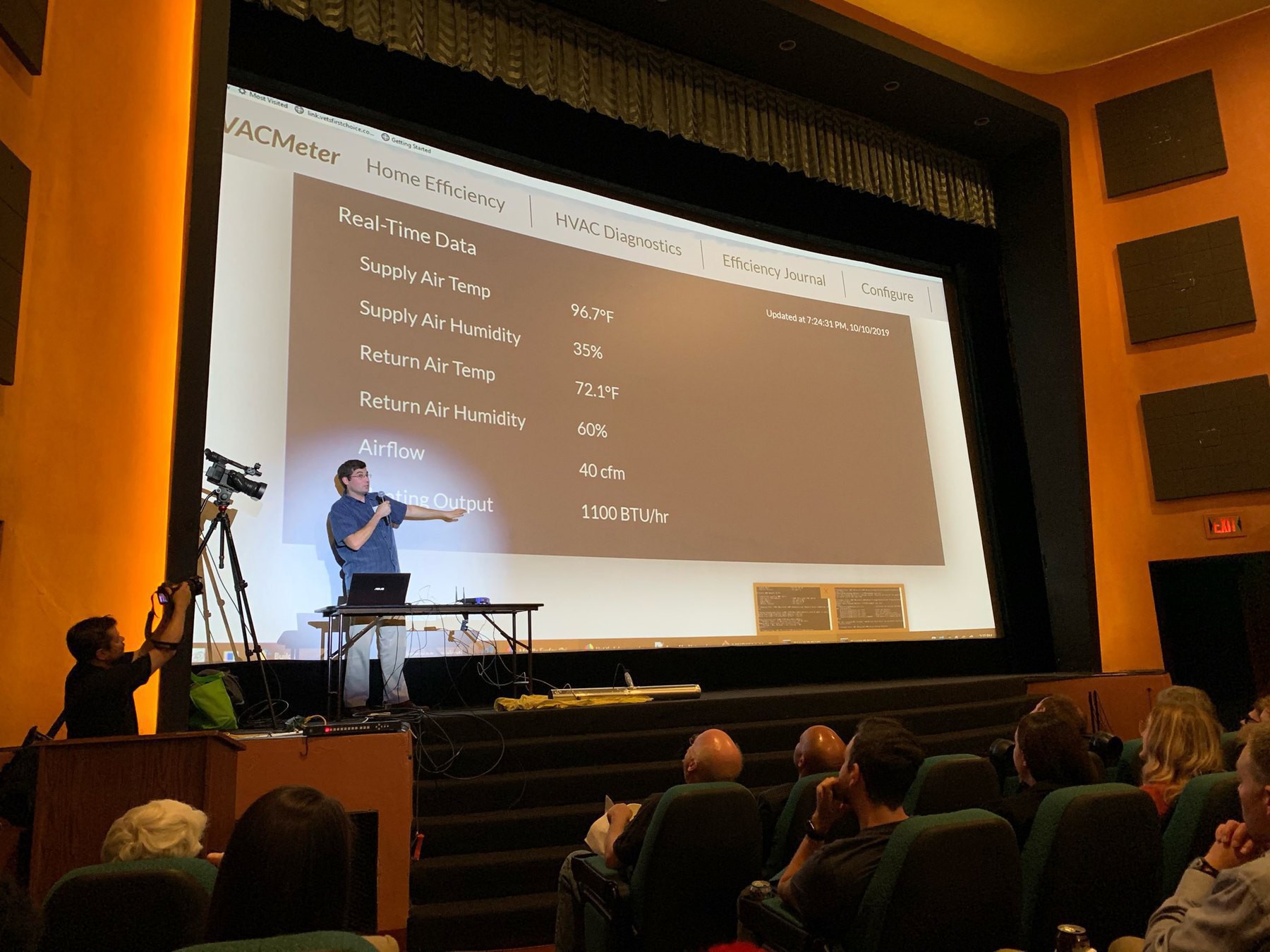
Crowd queuing up for Minnedemo 33 at the Riverview Theater!
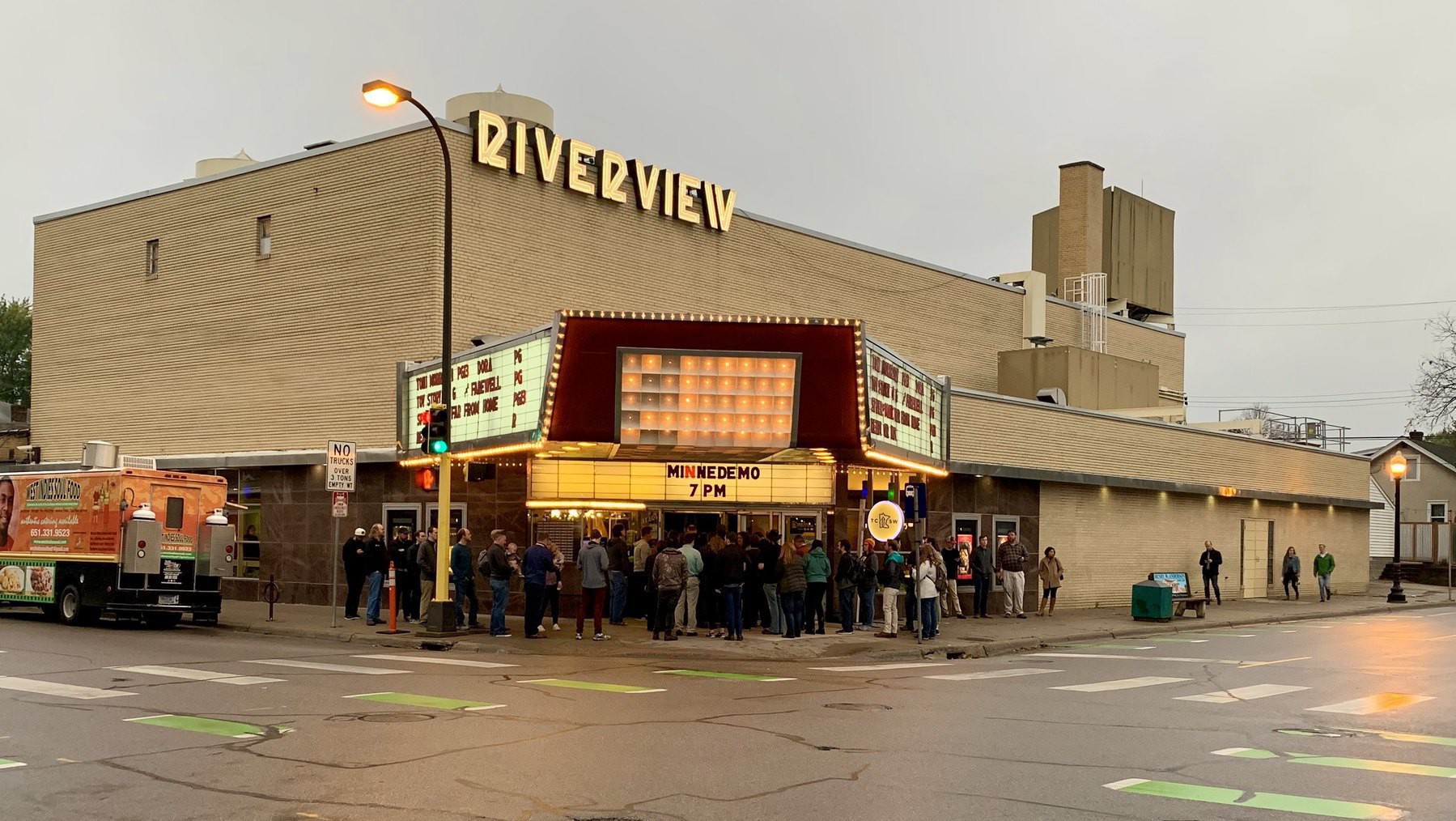
Minnebar 14
Minnebar 14 kicking off! Looking forward to learning a ton again this year! 💙 this event, organization, and the community that makes it!
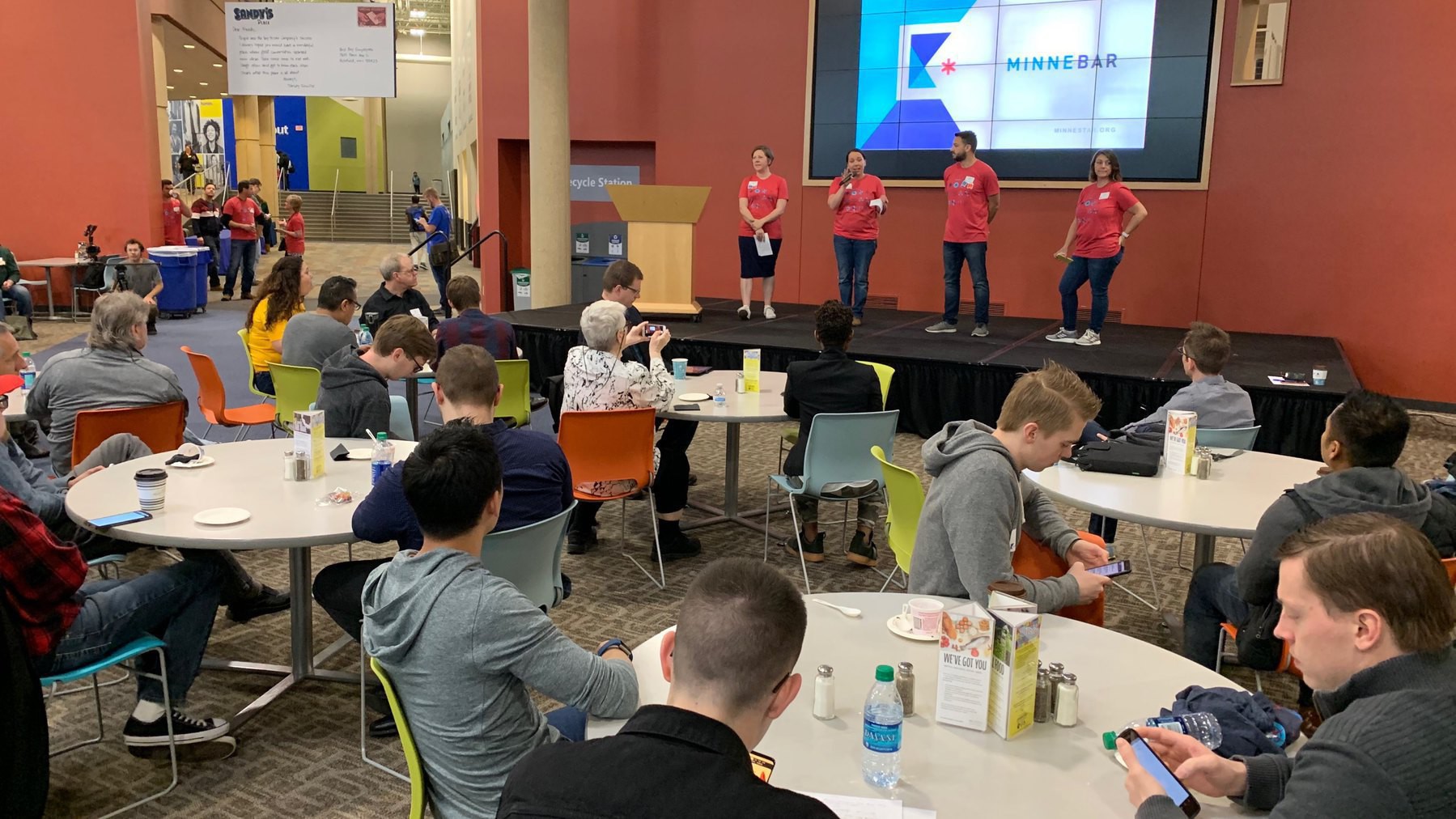
Great energy going into Session 0 at Minnebar 14! Record registrations!
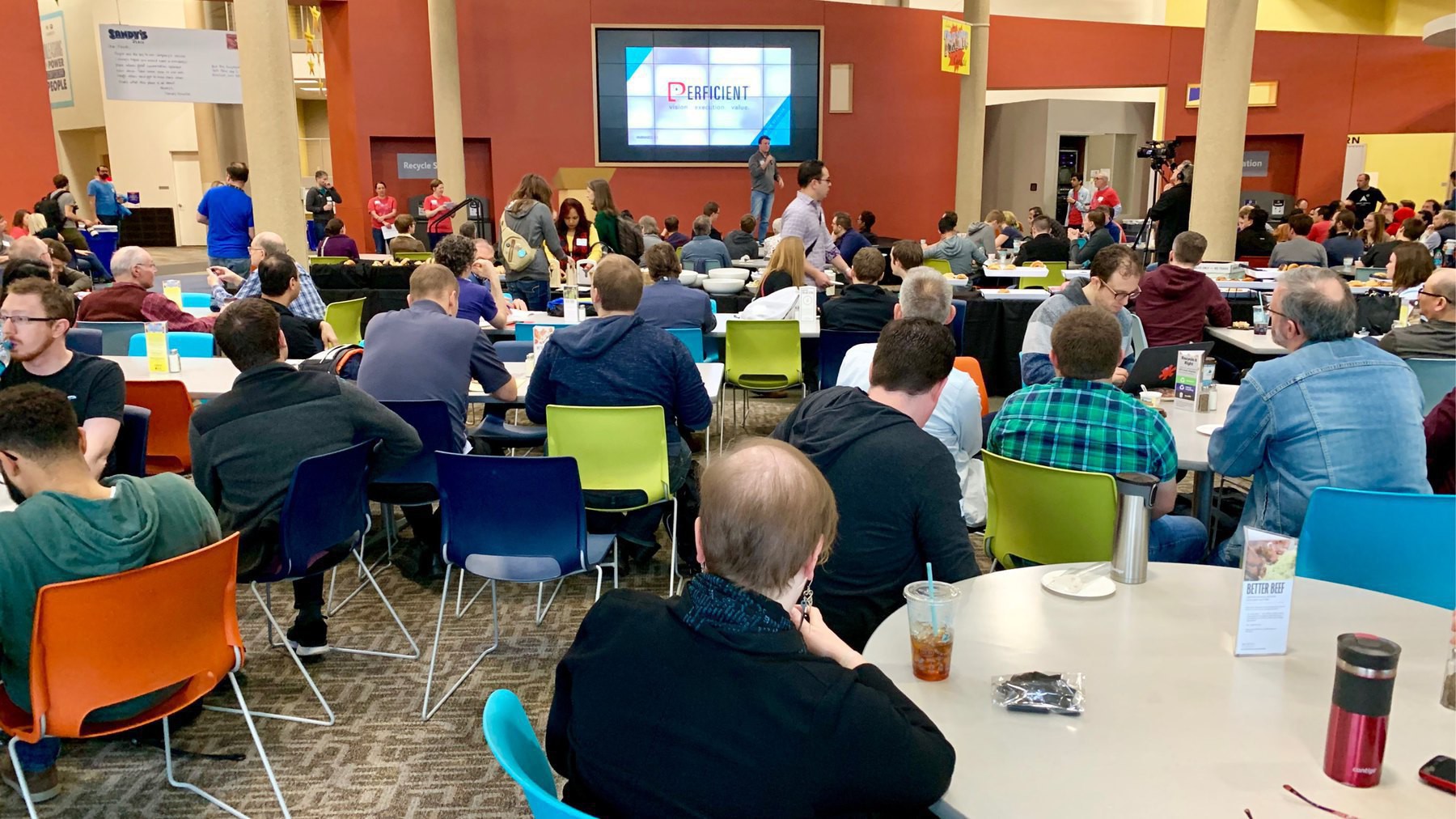
We have a growing, thriving technology community in the Twin Cities and Minnebar is an integral part of that community! I’ve been lucky to be involved with this organization since the beginning and love that SPS Commerce is a terabyte sponsor!
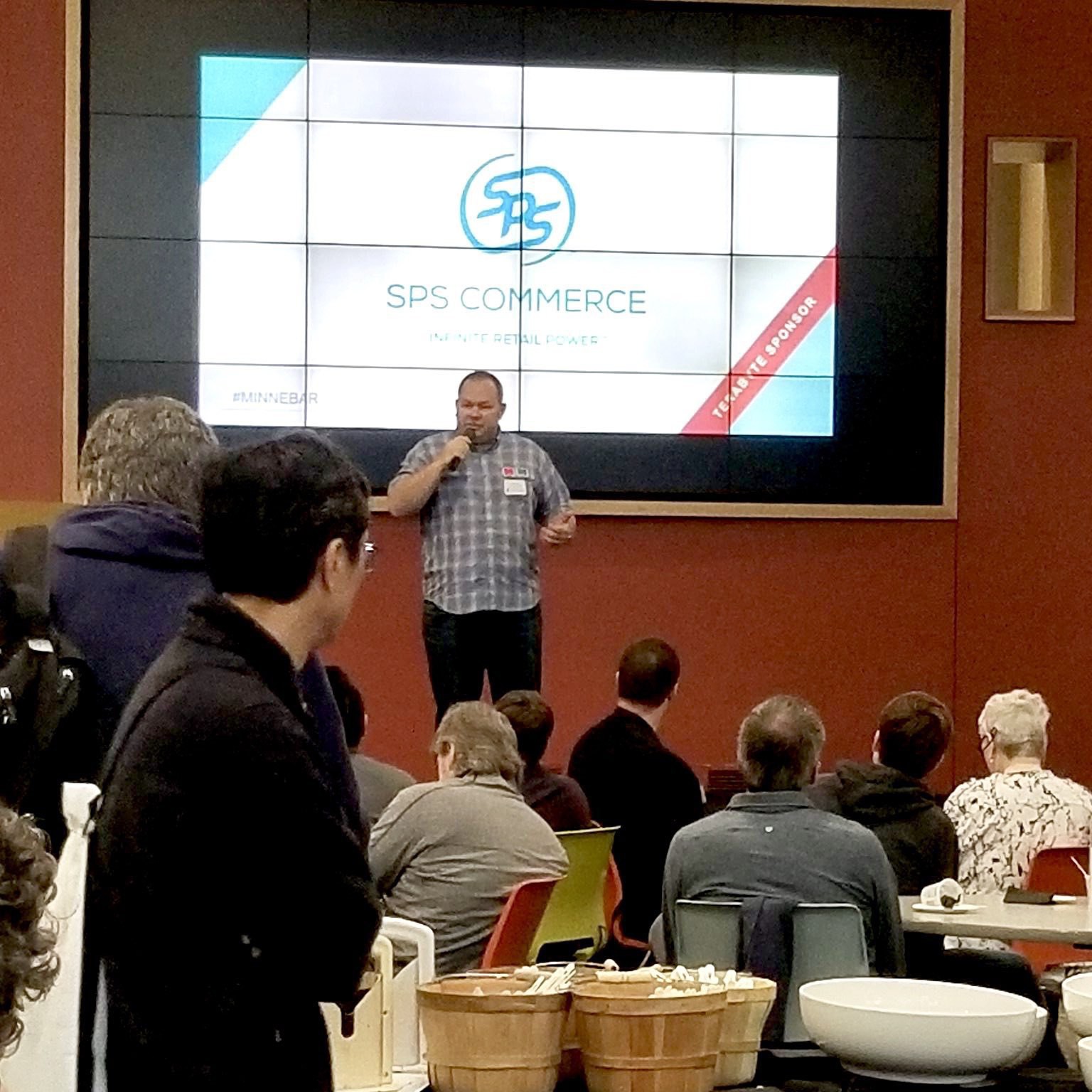
Good Session 0 at Minnebar 14 with a wake-up call from Sharon Kennedy Vickers on the issues that come from a lack of diversity in technology, and what we can do to improve as an ecosystem!
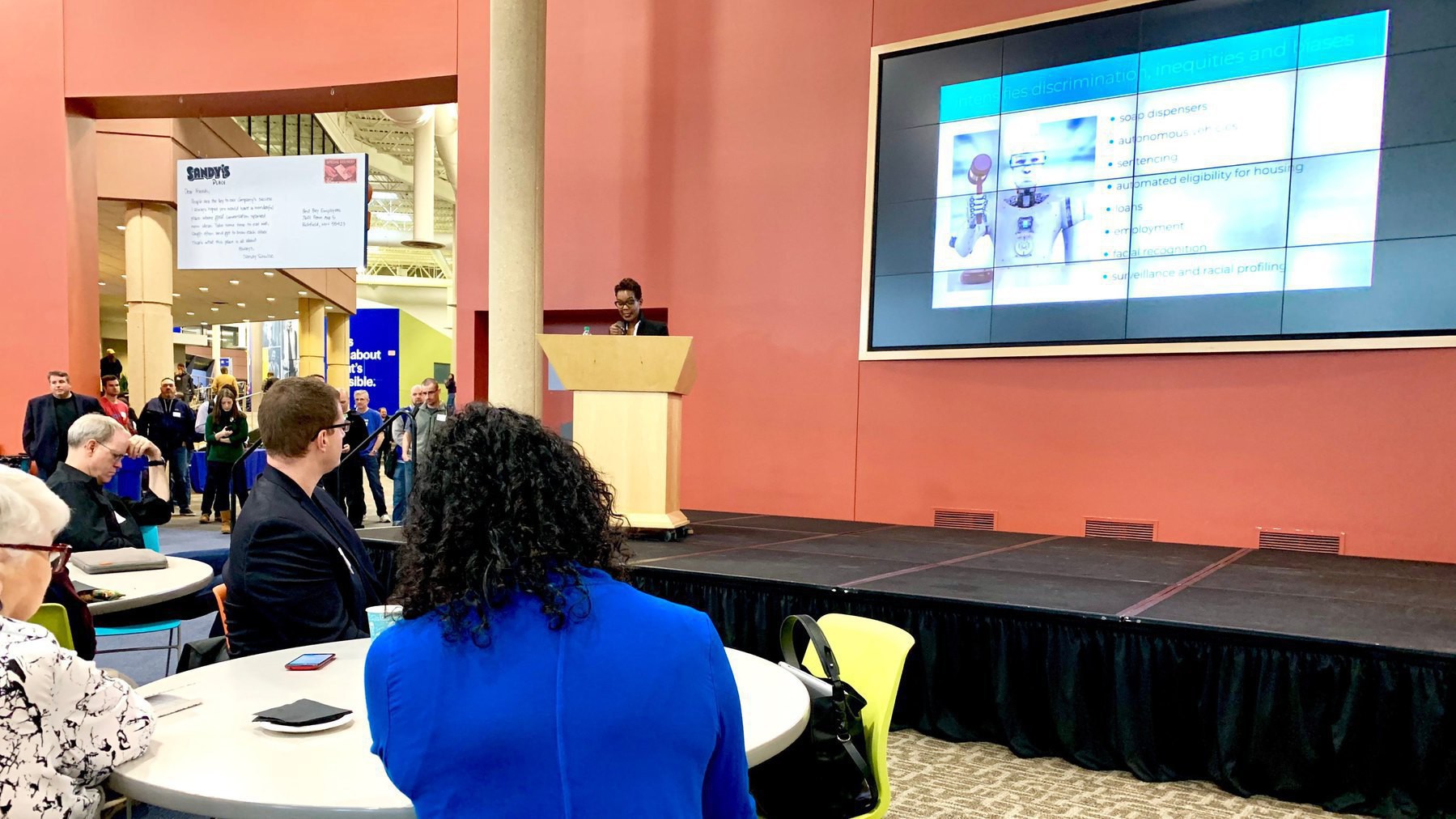
Good Minnebar open session on Product Management with Adrienne Peirce, Shawn Heller, and Jeremy Moede. Lot of knowledge sharing!
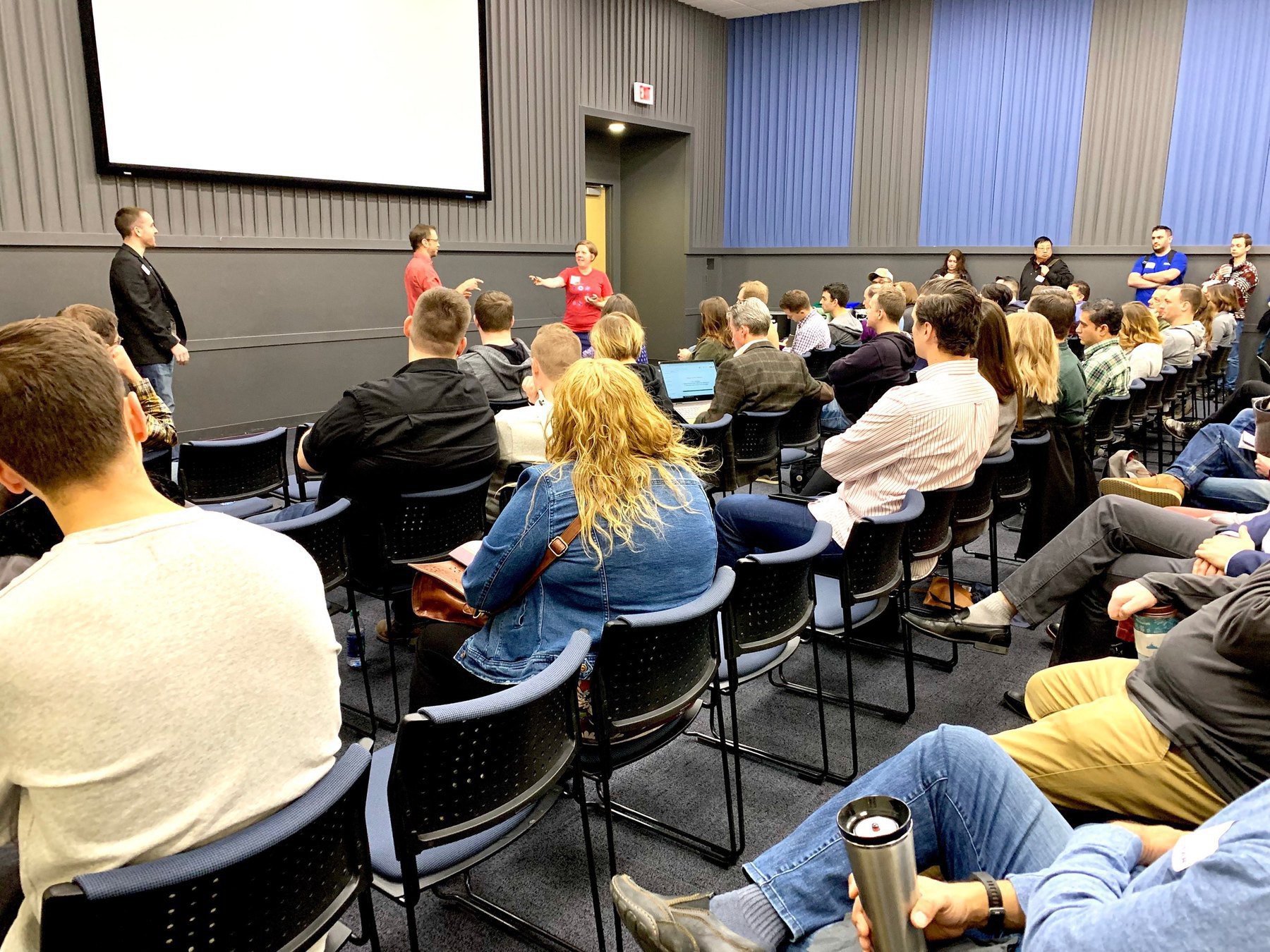
See also Minnebar collection.
Minnedemo 30
Excited for Minnedemo 30 tonight! And always proud to have SPS Commerce as a Terabyte sponsor!
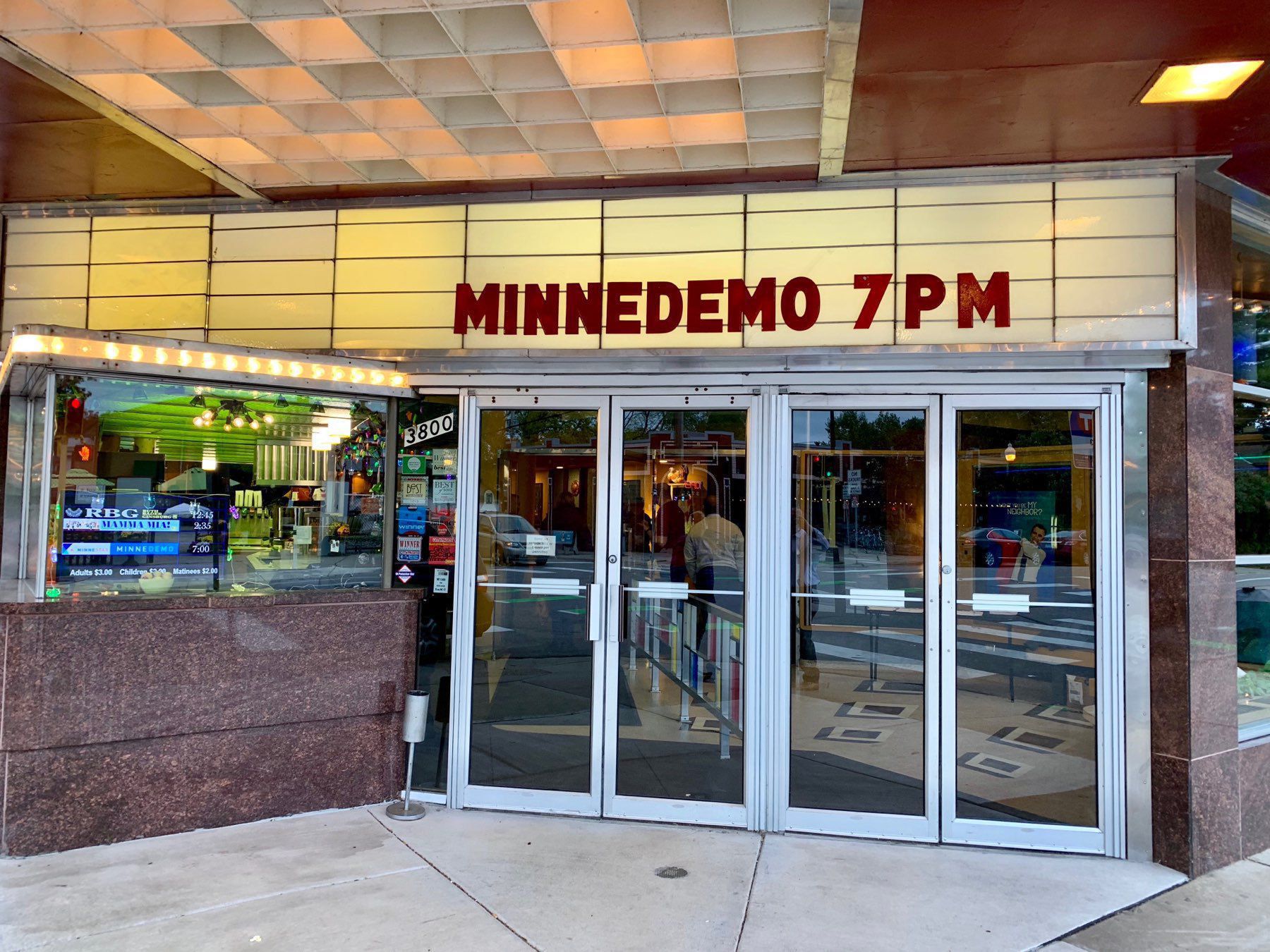
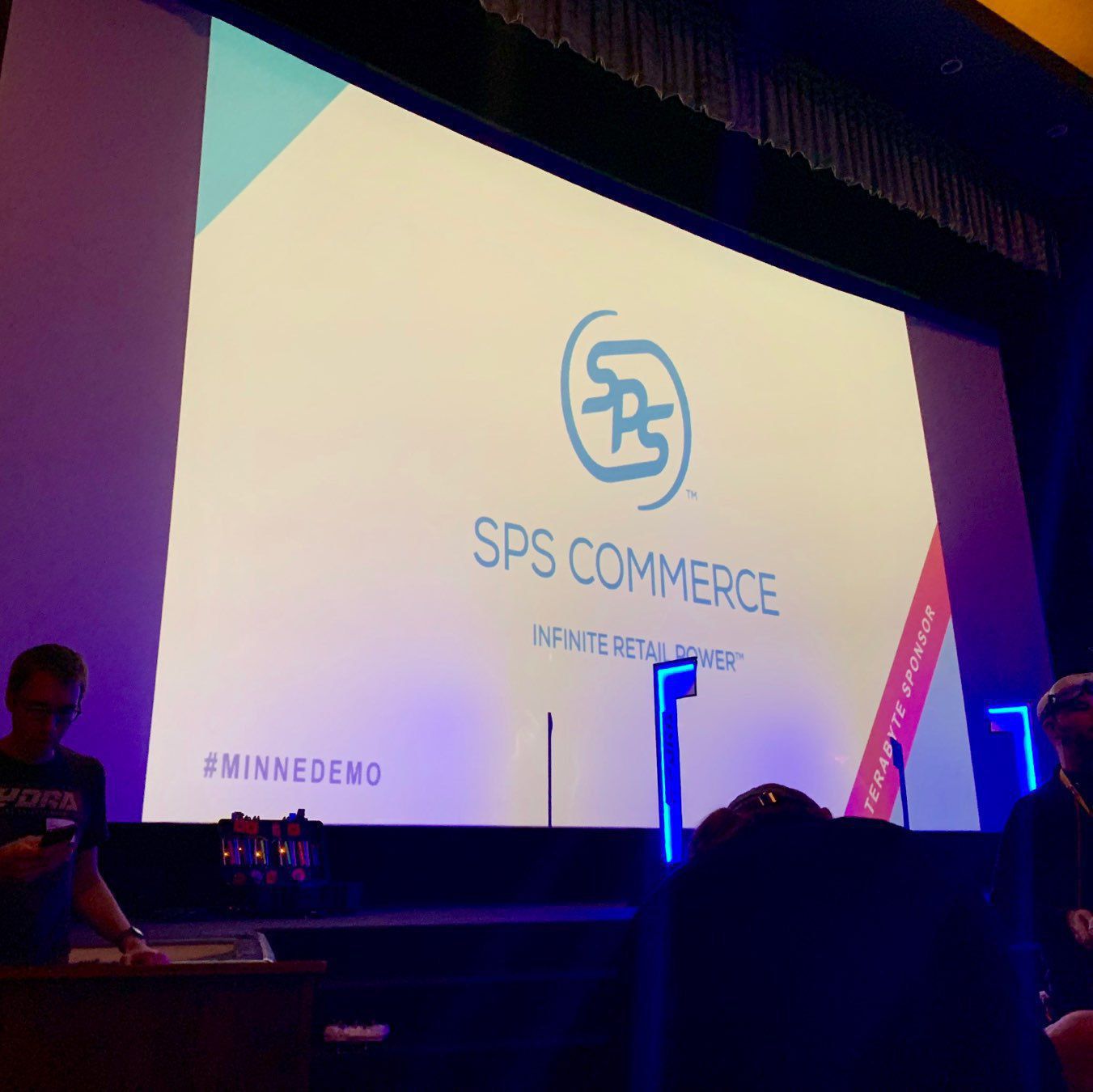
Great Minnestar board meeting today! Lucky to be part of a great organization helping to connect the Twin Cities technology community. 🙌
Minnebar 13
Today I went to my 13th Minnebar — I haven’t missed one yet! For the first time ever we had a blizzard to contend with. Usually Minnebar is competing with the first great days of spring. This year, we were worried if people could get to the event because of the snow. This was also the first Minnebar for our new Maria Ploessl, our new Executive Director, to take the lead on. The event went off great, with more coordination than the last couple of years.
The sessions I went to today at Minnebar.
Here are some pictures from some of the sessions I went to.
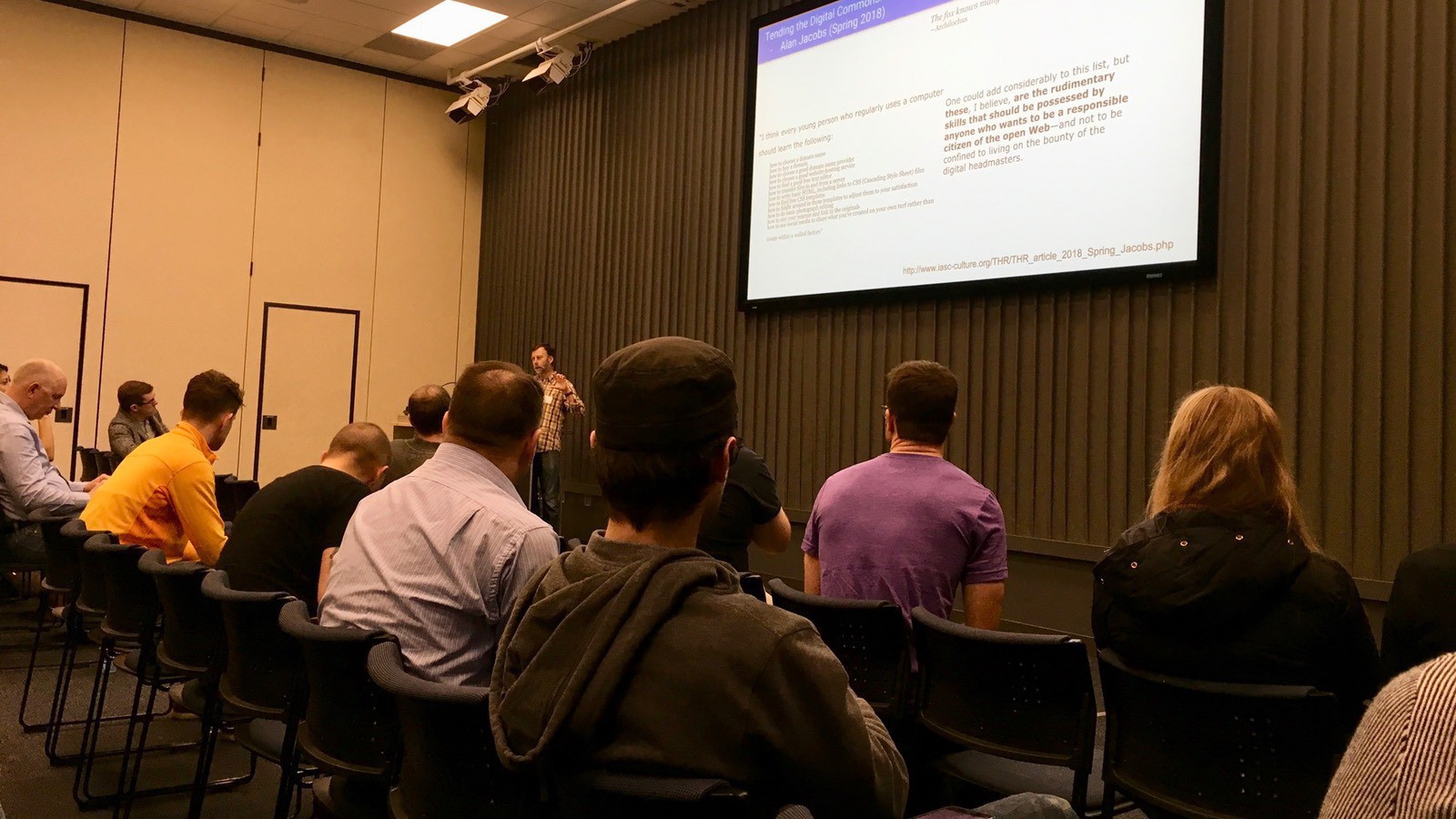
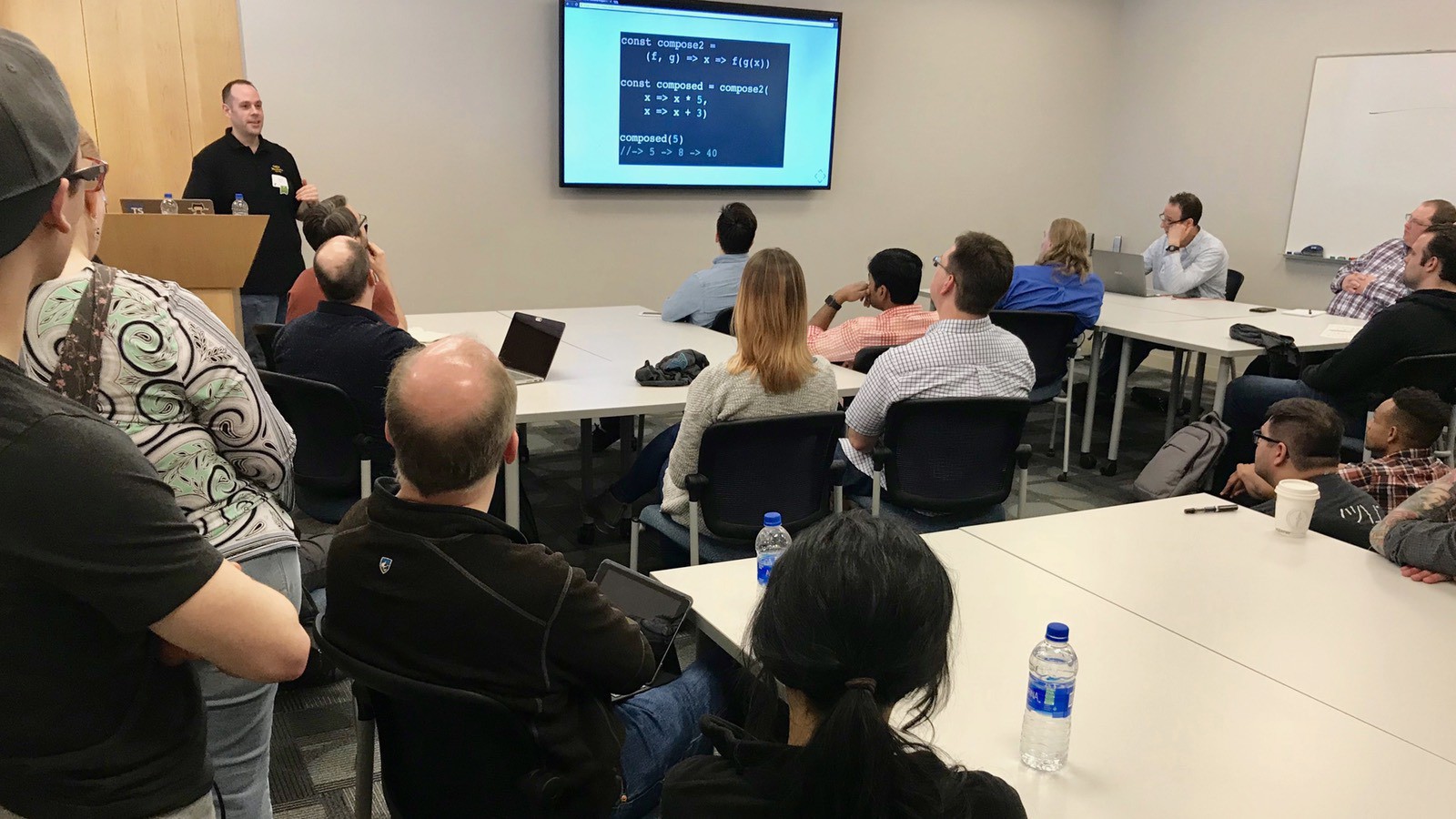
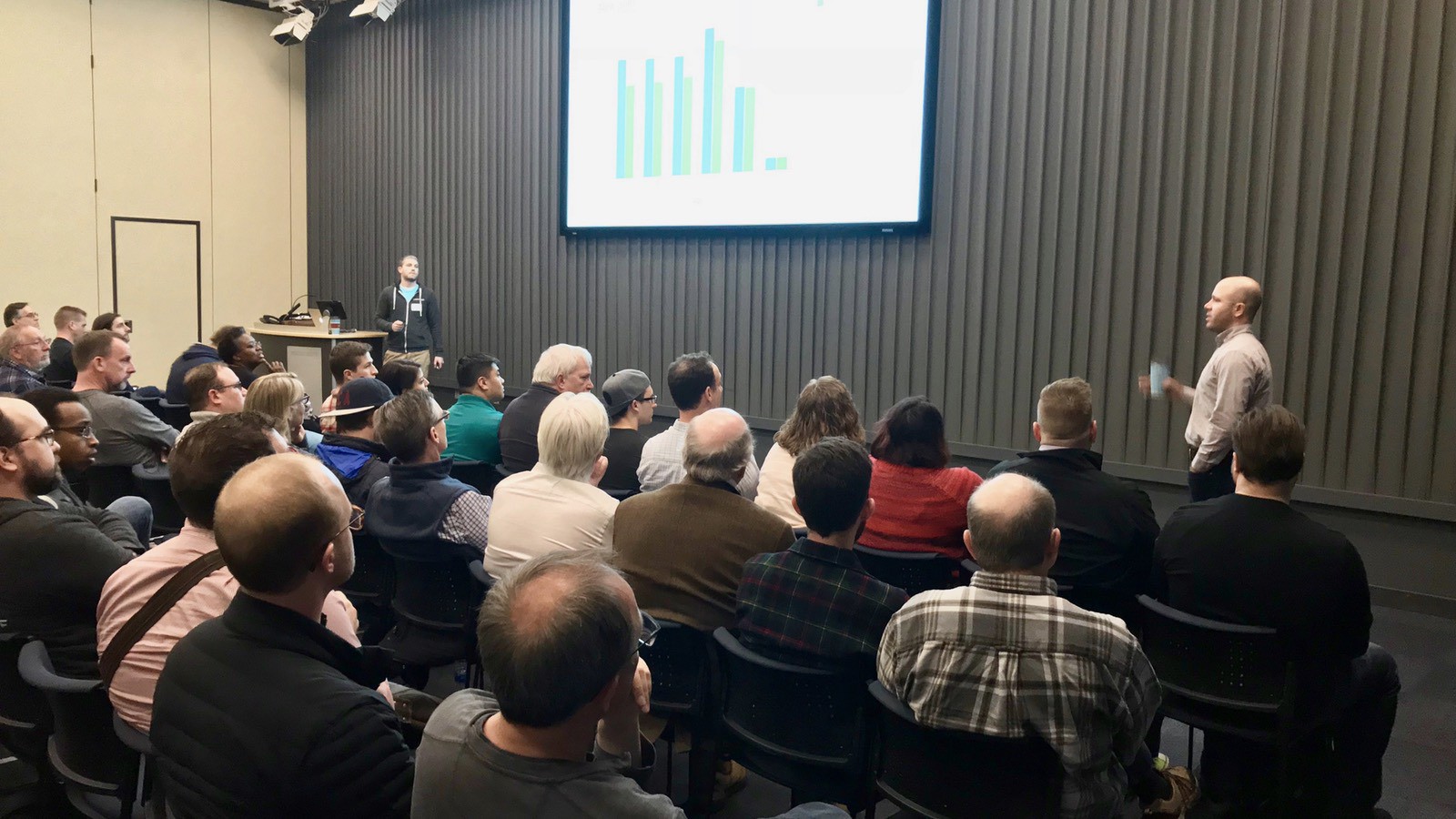
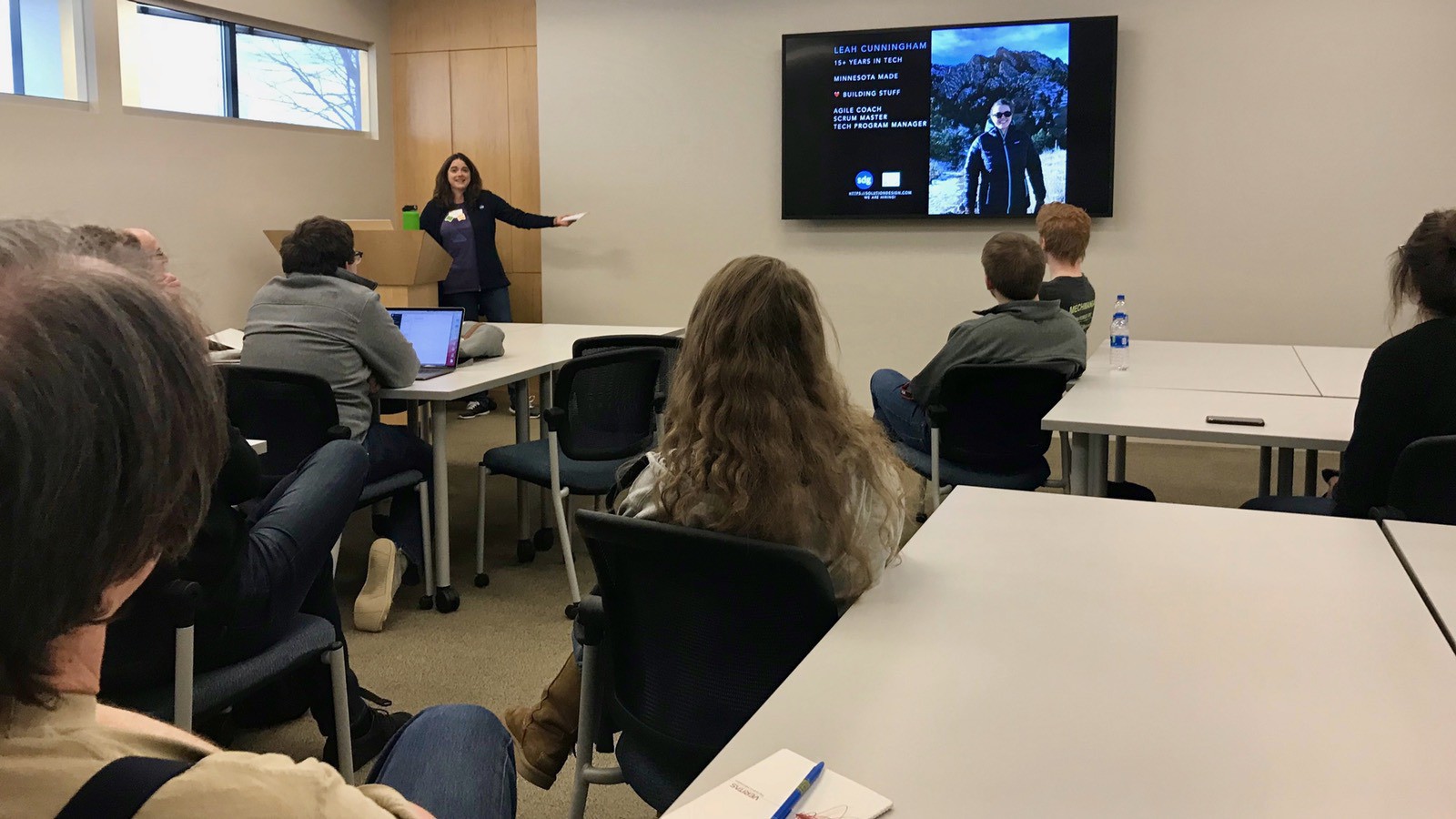
See also Minnebar collection.
Minnebar lunch panorama.

Join me in supporting Minnestar and the Twin Cities technology community by becoming a Community Supporter. As a board member, we are matching the first $10,000 in donations over the next 100 days! Donate today!
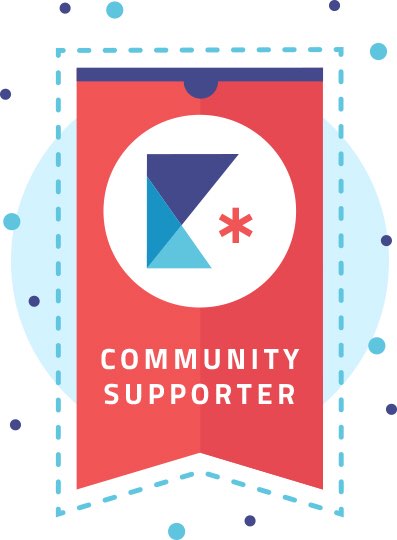
Bridget Kromhout kicking off Minnebar 13 Session 0. 👏
